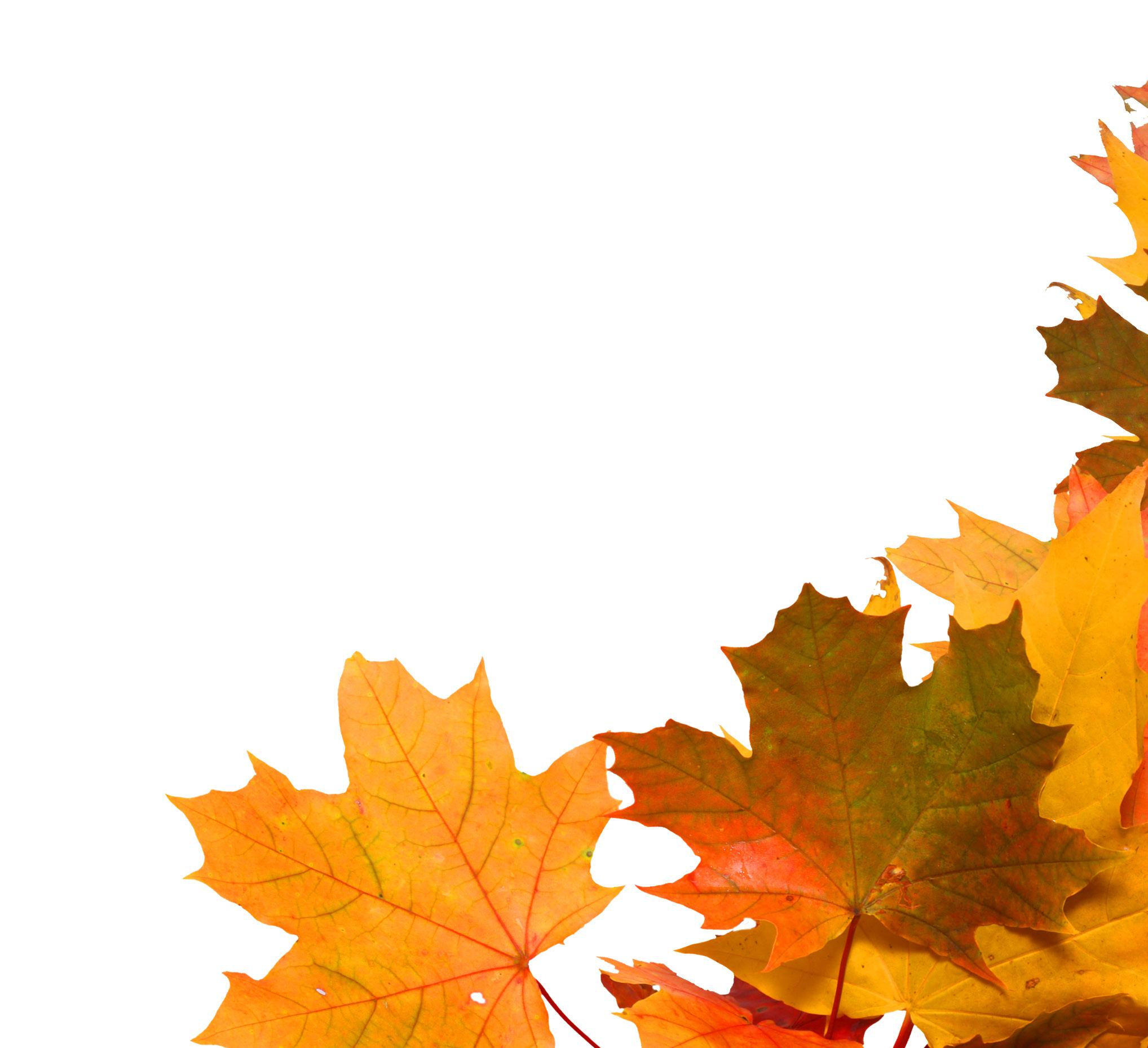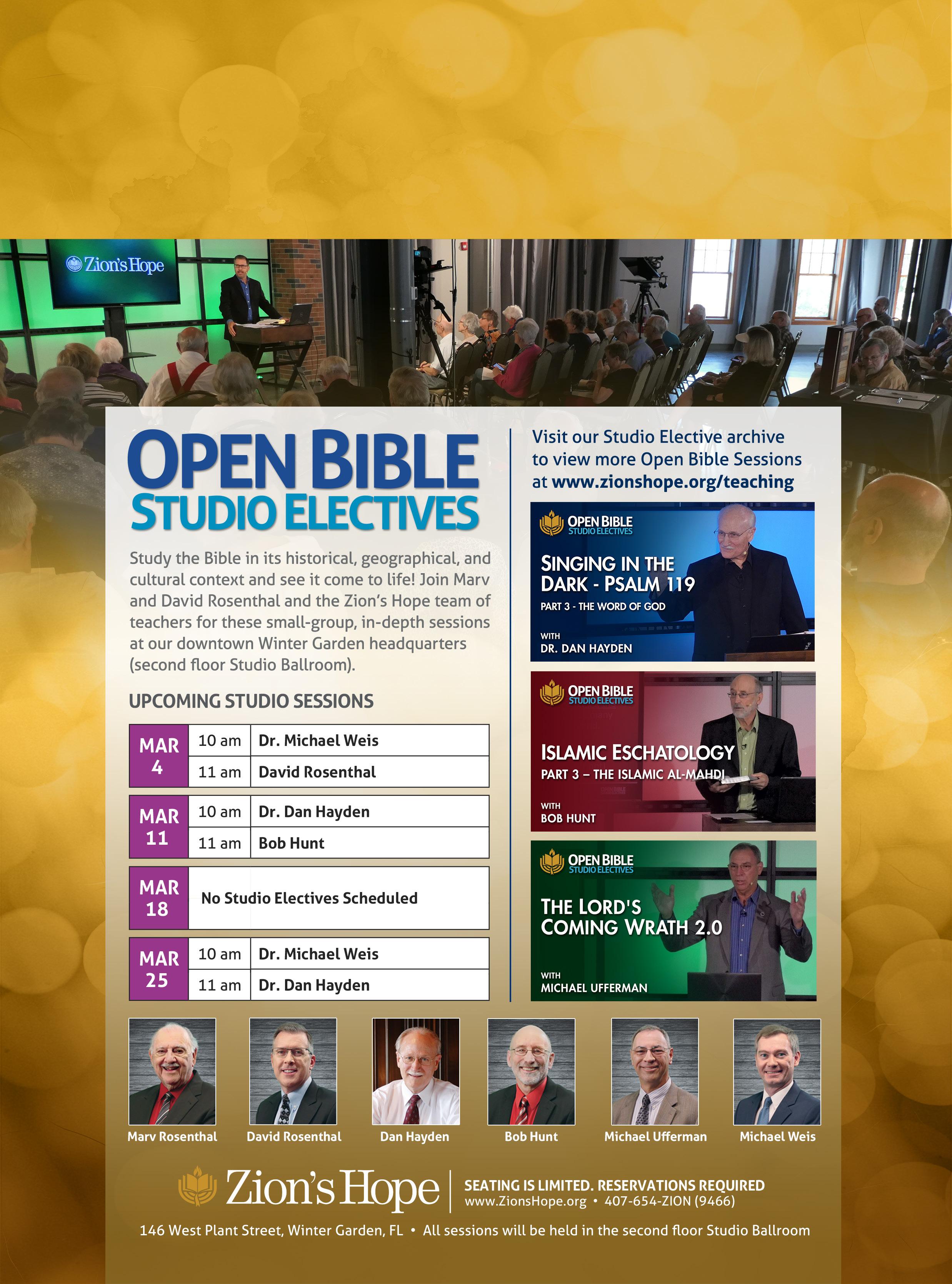
The FeasTs
oF The Lord:


oF The Lord:
From the to the
The redemptive work of Christ at His first coming
The events yet to unfold at Christ’s second coming
Sign up to receive the latest from Zion’s Hope at www.zionshope.org
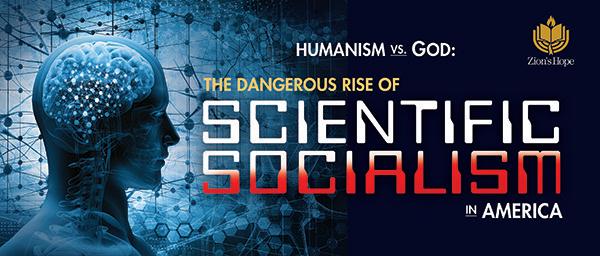
Zion’s Fire Magazine
Zion’s Fire is a publication of Zion’s Hope. © Copyright 2021 by Zion’s Hope, Inc., P.O. Box 783369 Winter Garden, FL 34778-3369
Production staff
Editor-in-Chief: Marvin J. Rosenthal
Managing Editor: David Rosenthal
Graphic Design: Catherine LeMand
Michael Feland
Cheryl Philips
Copy Editors: Marbeth Rosenthal
Michael Ufferman
David Ettinger
Typist: Marbeth Rosenthal
Subscriptions
A one-year subscription is $20. A two-year subscription is $30. Add $10 per year for foreign subscriptions. 407-654-ZION (9466) • 1-888-781-ZION (9466)
Identification
Zion’s Fire (ISSN 1052-2301, USPS 005423) is published bimonthly by Zion’s Hope, Inc., 146 West Plant Street, Suite 300, Winter Garden, FL 34787-3136. Periodicals postage paid at Winter Garden, FL and additional mailing offices.
POSTMASTER: Send address changes to:
Zion’s Hope, Inc., P.O. Box 783369 Winter Garden, FL 34778-3369
Printed in the USA by Print By Design, Inc. All photos, unless otherwise noted, are © by Shutterstock.com
Our Purpose and Passion
Zion’s Hope is a Bible-based ministry whose purpose is to proclaim to Jewish and Gentile people throughout the world their need for personal salvation through Jesus, the Messiah of Israel. We’re also committed to helping Christians grow in their understanding of biblical prophecy and the importance of Israel in God’s plan for the Last Days. To that end, we teach Scripture in its historical, geographical, and cultural context to prepare God’s people for end-time events and the return of Jesus Christ.
Giving
Your generous support for the ministry of Zion’s Hope is greatly appreciated. All donations will generate a tax-deductible receipt.

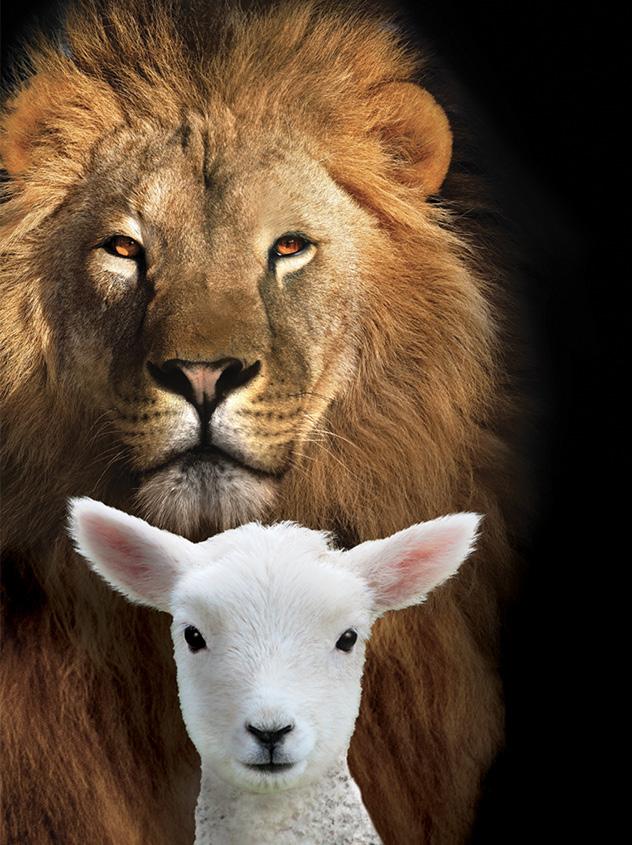
The special issue of Zion’s Fire you now hold in your hand brings to life a topic not often discussed, but one that is vitally important. It would not be an overstatement to say the Feasts of the Lord reveal to mankind the most consequential events of human history. Nevertheless, the Feasts are also some of the most misunderstood and overlooked topics in God’s Word today. Tragically, millions of Jewish people and multitudes who call themselves “Christians” are largely unaware of the historical significance and staggering future implications revealed in the Feasts.
Infinitely more important than just a series of cultural observances, Israel’s Feasts are appointed by the Lord, and they are owned by Him. He calls them, “My Feasts.” As such, the Feasts are literally divine appointments. They were given by God to His covenant people for the purpose of revealing His redemptive plan for humanity through the person and work of His Son, Jesus Christ. Together, the Feasts of the Lord form God’s prophetic calendar – from Christ’s crucifixion on Calvary to the future establishment of His Millennial Kingdom on Earth. Amid the uncertainty and chaos of our changing world, you can rest in the absolute assurance that no power in the universe can thwart the sure and steadfast redemptive plan of God. With His covenant people, God established seven divine appointments. The first four are history and they occurred right on schedule. The last three are still future and they will occur very soon right on schedule, exactly as He has promised.

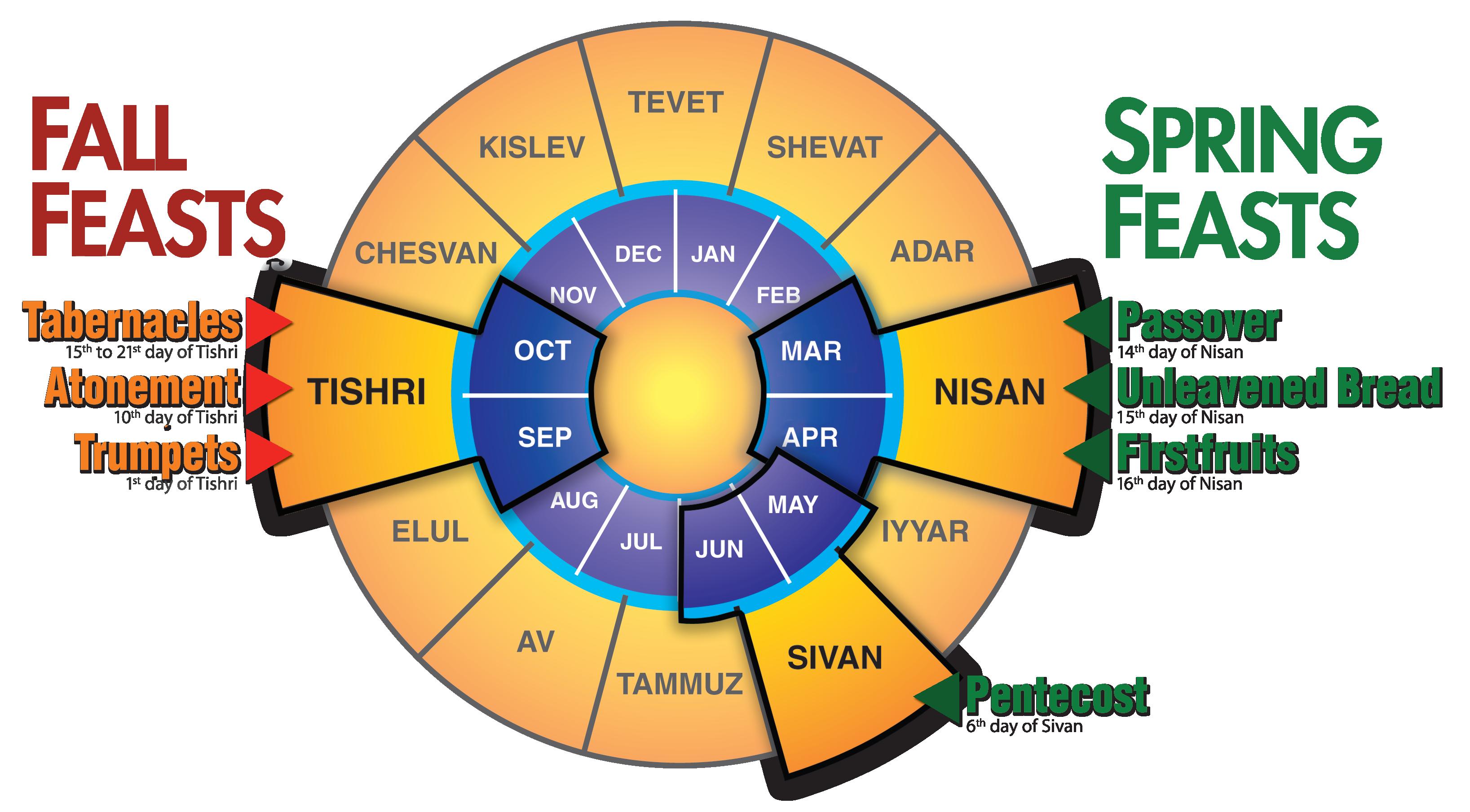
 Written by Marvin J. Rosenthal
Written by Marvin J. Rosenthal
Men and women the world over observe holidays. There is not a nation anywhere, even among the most primitive of peoples, which does not have its unique days of special celebration. Holidays are often in memory of significant political events; sometimes they commemorate the birth dates of national heroes; and frequently, holidays are simply designed to observe religious beliefs, superstitions, and folklore. Worldwide, thousands of holidays are observed annually.
These
. . . the eternal God instituted only seven holidays . . . holidays are called
In marked contrast, the eternal God instituted only seven holidays. And while it is not inappropriate for people to establish days of special celebration, their significance cannot be compared with the importance of the seven holidays instituted by God. These seven holidays are discussed throughout the Bible, in both the Old and New Testaments. However, only in one place, Leviticus Chapter 23, are all seven holidays listed in chronological sequence.
originate with the human race.
The holidays are, quite literally, the feasts of the Lord (Leviticus 23:4). Only on His terms and at His invitation can men and women participate in them and enter into their joyous eternal benefits.
THE OF
Feasts the Lord.
These seven holidays are called the Feasts of the Lord. The expression “feasts of the Lord” indicates these holidays are God’s holidays. They uniquely belong to Him. That is in contrast to holidays which
The Hebrew word translated feasts means “appointed times.” The idea is that the sequence and timing of each of these feasts, or holidays, have been carefully orchestrated by God himself. Each is part of a comprehensive whole. Collectively, the seven feasts prophetically tell the story of redemption.
These feasts are also called holy convocations; that is, they are intended to be times of meeting between God
Since these of the Lord are appointed times that He alone designed for holy purposes, they carry with them great sacredness and unequalled significance.
and man for holy purposes.
Since these seven feasts of the Lord are appointed times that He alone designed for holy purposes, they carry with them great sacredness and unequalled significance. A number of important points need to be emphasized concerning these feasts.
FIRST, these seven feasts of the Lord were given to the Hebrew nation.
The Jewish people are God’s covenant people.
SECOND, these seven feasts, as given by God, are closely tied to Israel’s spring and fall agricultural seasons.
When the feasts were instituted, Israel was largely an agricultural nation dependent upon the provision of God for daily sustenance.
THIRD, the timing of these seven feasts is based on the Jewish lunar (moon) calendar of 354-day years. It is approximately 11 days shorter than our 365-day solar year.
Periodically (seven times every 19 years), the Jewish calendar literally has a 13th month. If such were not the case, winter months on the Jewish calendar would, after a few years, occur in the summer, and summer months would occur in the winter. It is for this reason these holidays do not fall on the same day on the Gregorian calendar (the calendar commonly used today) each year.
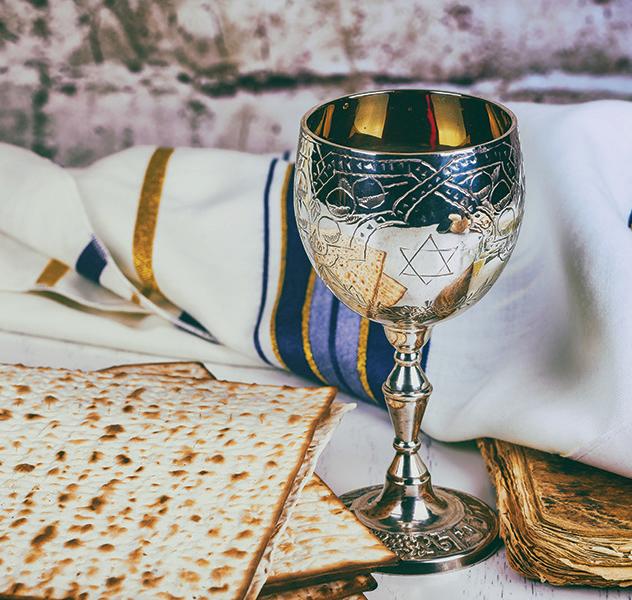
The feasts begin with Passover, the very day Jesus voluntarily gave Himself as a sacrifice for the sins of the world . . .
FOURTH, and fundamentally, these seven holidays typify the sequence, timing, and significance of the major events of the Lord’s redemptive career.
The feasts begin with Passover, the very day Jesus voluntarily gave Himself as a sacrifice for the sins of the world (at Calvary); and conclude at the feast of Tabernacles, the very day Jesus will return to establish His 1,000-year Messianic
Kingdom (Revelation 20:4).
No box has to be manufactured, no text twisted, and no truth manipulated to make these appointed feasts conform to specific major events in the life of Christ; they are clearly set forth in the Scriptures.
FIFTH, because the spiritual realities to which the feasts clearly point are fulfilled in Jesus, all people everywhere have been placed in a favorable position.
All of humanity has been extended an invitation to meet with God on His terms and receive the blessings made available through Christ’s fulfillment of these feasts. All men and women have been placed in a reconcilable position. Thus, the divine invitation, “Come unto me, all ye that labour and are heavy laden, and I will give you rest” (Matthew 11:28).
To turn down this unprecedented and gracious invitation to meet with the Sovereign of the Universe at His appointed times is the height of pride and folly. To appropriate these opportunities is the apex of humility and wisdom.
SIXTH, the participation of Gentiles in the blessing associated with the feasts God appointed for Israel should come as no surprise.
It is consistent with God’s unconditional covenant to the patriarch Abraham, the central provision of which is, “In thy seed shall all the nations of the earth be blessed” (Genesis 22:18). Jesus himself taught, “Salvation is of the Jews” (John 4:22).
Israel and the Church are distinct entities with distinct promises. However, every blessing which the true Church now enjoys and every hope which she anticipates comes out of the Abrahamic, Davidic, and New Covenants which God made with Israel. There is a contiguous relationship between the Old and New Covenants and between Israel and the Church. Therefore, it should not be thought that Gentiles cannot enter into the blessings which were accomplished through the Messiah in connection with the feasts God made with Israel.
The Old Testament is revealed in the New Testament, and the New Testament was concealed in the Old Testament.
There is hardly a theme to which people can give their attention that is loftier or more important than the seven feasts of the Lord. Permit it to be repeated one more time, for its importance warrants it: These seven feasts depict the entire redemptive career of the Messiah – from the cross of Calvary to Christ’s coming Kingdom.
“Seven” is the biblical number for perfection and completion. After creating the world, God rested on the seventh day. He did not rest as a consequence of growing tired; omnipotence does not grow tired, and God is omnipotent. Rather, God rested in the sense of completion and satisfaction. What God created was good and satisfying. Nothing else was needed. Therefore, He rested on the seventh day.
Concerning the number seven, note its importance in the Scriptures:
First, on the seventh day of the week, the children of Israel were to observe a Sabbath rest, patterned after God’s creation rest. They were to rest from all their labors (Exodus 16:23, 30).
Second, the seventh month of the year is, according to the Scriptures, especially holy. In that month, all three fall feasts are observed (Leviticus 23:24, 27, 34).
9:24-27). This text is the backbone for understanding prophecy.
The Book of Revelation records the consummation of this age. It uses the number seven more than 50 times. Significantly, the Book revolves around seven seals, seven trumpets, and seven bowls [vials] (Revelation 5:1, 5; 6; 8-9; 11:15-19; 15-16).
The Book of Revelation . . . uses the number seven more than 50 times.


The seven feasts of the Lord, then, are His appointed times during which He will meet with humanity for holy purposes. When completed, the seven holidays will bring this age to a triumphant end and usher in the glorious Messianic Kingdom Age to follow.
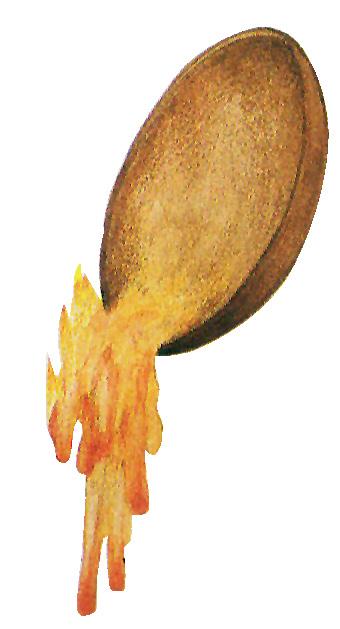
is the biblical number for perfection and completion.
Third, every seventh year the nation of Israel was commanded to refrain from farming the ground; they were to allow the soil to rest (Leviticus 25:4).
Fourth, under the Law, seven sevens of years were counted (49 years), and then the next year (the 50th) was to be the Jubilee year in which all debts were forgiven and all slaves set free (Leviticus 25:8-12).
Fifth, 70 sevens of years were determined upon the Jewish people during which time God would bring to perfection and completion His redemptive purposes for Israel and the world (Daniel
During that age, every man and woman will sit under their own fig tree (Micah 4:4). That concept is not intended to suggest boredom or a lack of creativity and activity, but completion and satisfaction. In that day, every good thing the heart could desire will be possessed, and righteousness, justice, and holiness will become a reality in the earth.
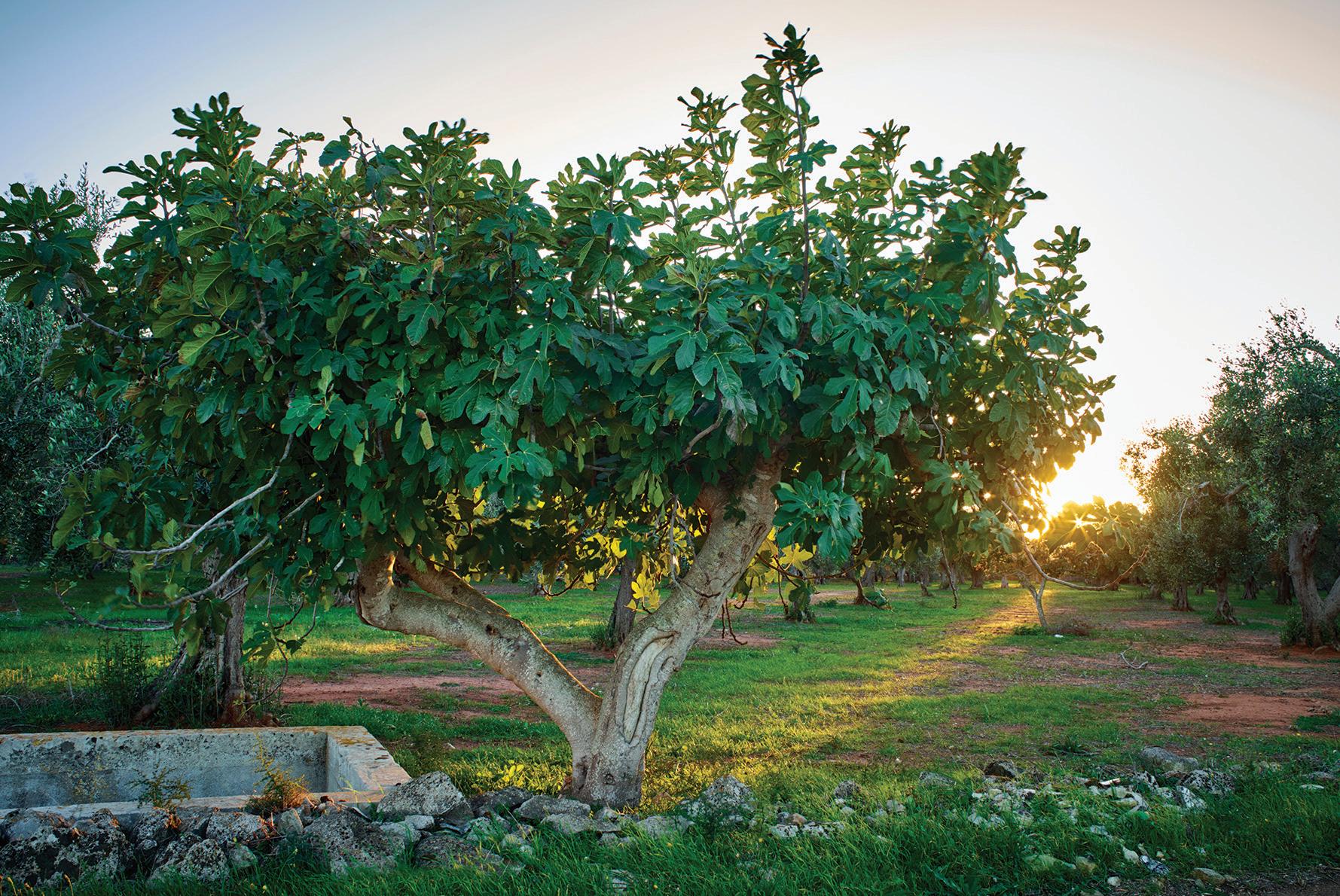
As will be shown, four of the seven holidays occur in the spring of the year (March-April). The fulfillments of those feasts – if a colloquialism may be used to emphasize the truth – are a “done deal.” That is to say, the events which the four spring feasts of the Lord typify in the Hebrew Scriptures have been fulfilled in the Messiah in connection with His first coming. In that sense, one can look back at and carefully examine these four appointed feasts. They
During [the glorious Messianic Kingdom Age], every man and woman will sit under their own fig tree (Micah 4:4).
In that day, every good thing the heart could desire will be possessed . . .
. . . the three final appointed times are still future in terms of literal fulfillment, biblical faith may lay hold of and live in the light of their future blessings today.
are history. They occurred almost 2,000 years ago. Their spiritual benefits, however, continue forward to the present hour and are available to those who choose to participate in them on God’s terms.
Again, as will be shown, the final three holidays occur in the fall of the year within a brief period of time in the Hebrew month of Tishri (which occurs in midSeptember or October). As the first four holidays depict events associated with Messiah’s first coming, these final three holidays depict specific events associated with His second coming.
Although the three final appointed times are still future in terms of literal fulfillment, biblical faith may lay hold of and live in the light of their future blessings today. The final three feasts lead directly to the second coming of Christ and what the Bible calls the blessed hope (Titus 2:13).
The four spring feasts, are summed up in the short span of 19 verses of Scripture (Leviticus 23:4-22).
Passover. It occurred almost 3,500 years ago in Egypt. It was there, at that time, that a lamb was sacrificed and the blood was applied to each doorpost and lintel. When this was done in faith and in obedience to God’s command, that home was passed over and the life of the firstborn was spared (Exodus 12:13). All subsequent observances over the centuries have been memorials of that one and only true Passover.
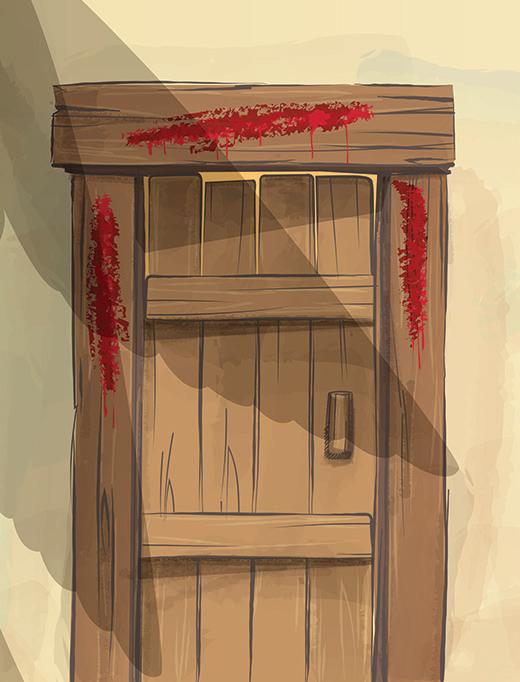
The first feast of the Lord is Passover (Leviticus 23:5).
The which follow are built upon it.
Without Passover the remaining six feasts would be meaningless. . .
These are the feasts of the Lord, even holy convocations, which ye shall proclaim in their seasons. In the fourteenth day of the first month at even [twilight] is the Lord’s passover (Leviticus 23:4-5).
The first feast of the Lord is Passover (Leviticus 23:5). It is the foundational feast. The six feasts which follow are built upon it. Without Passover the remaining six feasts would be meaningless – there could be no personal redemption.
Passover occurs in the spring, on the 14th day of the Hebrew month of Nisan (which occurs in March or April). It is said in the Bible to be the beginning of the year (Exodus 12:2), or what we would today call the new year.
While the Jewish people have celebrated the Passover annually since the time of Moses, in reality there was only one
...
and the blood was applied to each doorpost . . . When this was done in faith . . . that home was passed over and the life of the firstborn was spared (Exodus 12:13).
In precisely the same way, there was only one occasion when the Messiah’s flesh was pierced and His blood spilled on the cross of Calvary for the sin of the world. The Lord’s Supper is an ongoing memorial of that once-and-for-all sacrifice for sin.
The events leading up to the Passover are among the most dramatic in all of Scripture.
The children of Israel were enslaved in Egypt. Pharaoh was a harsh taskmaster. The status of the Hebrews seemed hopeless. It was at that hour of history that God spoke to Moses from within a burning bush. It was a desert area; the bush was dry and sapless. Everything normal and natural argued for the speedy consumption of that thornbush. But such was not to be. The bush burned and was not consumed (Exodus 3:2). Not without reason, therefore, Moses turned aside to see this unusual sight. And from the midst of that burning bush, God would speak to His servant.
That burning bush typified Israel. Through the centuries, she would experience the hot flames of satanic fury often manifested in the form of vehement anti-Semitism. She would burn, but would not be consumed. And as God spoke to
Moses from the midst of a burning bush, He has spoken to the world amidst the fiery trials of Israel. She alone from among the nations of the world was the depository of God’s Word to humanity. And she alone among the nations travailed to give birth to the Son of God. When holy men penned God’s Word as they were borne along by the Holy Spirit, they were Jewish men with names such as Moses, Isaiah, John, Peter, and Paul. And when a woman gave birth to the Messiah, it was a Jewish woman named Miriam (anglicized to Mary).
God would tell Moses He, the Lord, had seen the affliction of His people down in Egypt; He had heard their cry for help; and He knew their sorrows. And now, He was coming down to deliver them out of Egyptian bondage and bring them into the Promised Land (Exodus 3:7-8).
At that moment, the Hebrews were a motley group of unorganized and uneducated slaves. They knew nothing of nationhood yet. That would happen at Mount Sinai with the giving of the Mosaic Law. They carried about, under their nails and in their hair, the mud of the slime pits of Egypt. There was nothing innately desirable about this group of unkempt slaves who had, through the years, all but forgotten their God. Lesser gods – created in people’s minds and fashioned by people’s hands from wood and stone – would have passed them by. After all, the Hebrews had not been faithful to their God.
It could have been argued that He owed them nothing, that He was no one’s debtor; but not so of the true and living God. He was the God of Abraham, Isaac, and Jacob. And to them He had solemnly promised their seed would be as the sand of the seashore and the stars of the heavens without number (Genesis 15:4-5).
God is a covenant-keeping God. What His mouth speaks, His right arm of power performs. Therefore, the Hebrews –however unattractive and undesirable they may have appeared at that moment –were still “His people.” He was aware of their affliction, and by His reckoning, it was time for them to pack their bags and head for home after more than 400 years as slaves in Egypt; and so He said to Moses, “I have

surely seen the affliction of my people” (Exodus 3:7).
Cecil B. deMille, in his epic The Ten Commandments, while using the best cinematography and special effects of his day, did not overstate the reality of the exodus from Egypt; nor could the movie industry today with all of its technology in a remake of The Ten Commandments overstate the miraculous nature of the exodus.
The eternal God was at work. He hardened Pharaoh’s heart so he would not let the children of Israel go. And then, plague after plague was unleashed with deadly accuracy against the idolatrous land of Egypt. Each of the plagues was directed against an Egyptian deity, until, at last, the firstborn of each home in Egypt would perish where a lamb was not slain and the blood was not applied to the doorposts. The plague reached even to the palace of Pharaoh. Since the pharaoh of Egypt was worshiped as a god, a god’s son would die.
Finally, in desperation, Pharaoh consented to let the children of Israel go. Under Moses, the servant of the Lord, it is estimated that more than a million and a half slaves, with all of their possessions, marched past the Sphinx of Egypt into the desert.
What a scene that must have been to behold! What insanity by human standards!
A million and a half or more emancipated slaves marching off into the desert!
. . . after more than 400 years as slaves in Egypt; and so He said to Moses, “I have surely seen the affliction of my people” (Exodus 3:7).
. . . more than a million and a half slaves, with all of their possessions, marched past the Sphinx of Egypt into the desert.
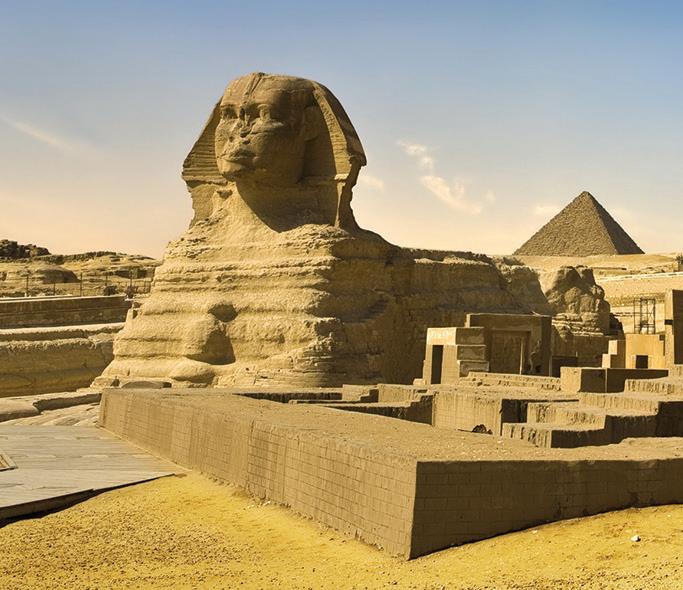
God is a covenant-keeping God. What His mouth speaks, His right arm of power performs.
Water, food, shelter, clothing – from where would these most basic necessities come? These Hebrews . . . knew little about where they were going or how they would get there.
Unlike most ancient cities, there was no great wall surrounding the nation of Egypt. None was necessary. The inhospitable desert provided the best protection. And here were the Hebrews, walking right into it – men, women, children, and livestock.
Water, food, shelter, clothing – from where would these most basic necessities come? These Hebrews, as they were known at that time, knew little about where they were going or how they would get there. Moses, however, knew the One who was leading them. They would cross the Red Sea, they would wander in the wilderness for 40 years; and ultimately, under Joshua, they would enter the Promised Land.
. . . to describe what took place in Egypt 3,500 years ago . . . one word,
. . . the one true Lamb of God who takes away the sin of the world (John 1:29).
Of the many words which could be used to describe what took place in Egypt 3,500 years ago, none fits better or is more comprehensive than the one word, “redemption.” The events were real, the miracles genuine – all wrought by the God of the Hebrews, who was greater than all the gods of Egypt.
A motley crew of slaves was redeemed so they could worship and serve the true and living God. But such redemption was not without cost; blood had to be shed to secure their redemption.
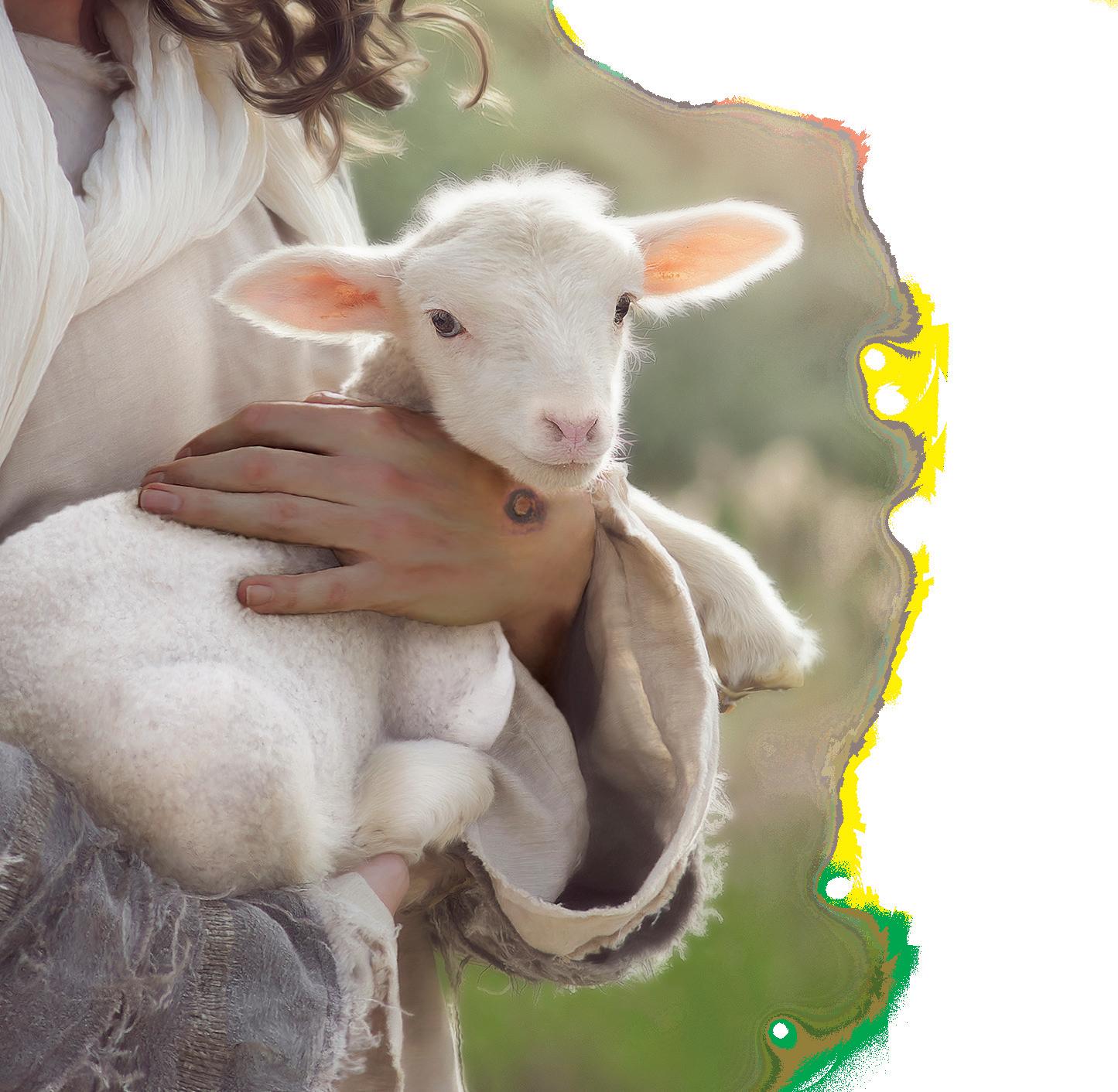
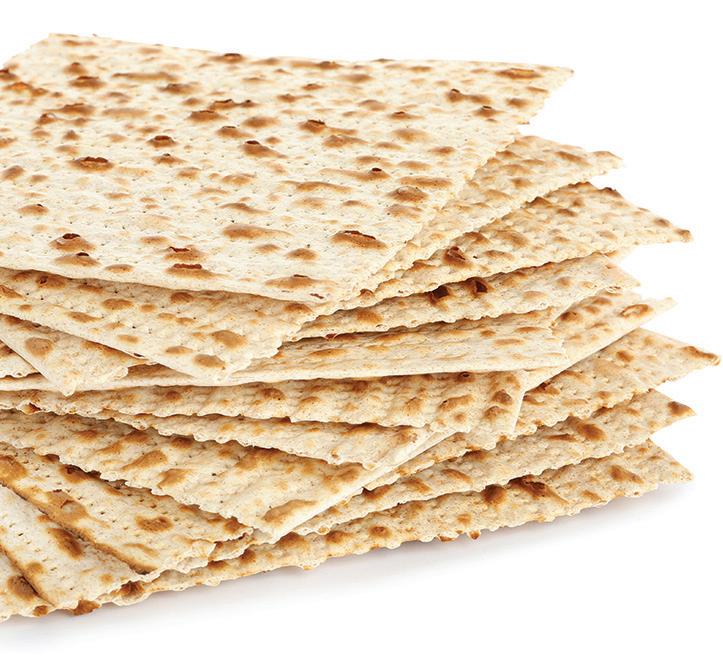
All of those lambs sacrificed in Egypt (one per household each year) pointed to the one true Lamb of God who takes away the sin of the world (John 1:29). Writing to the Corinthians, the apostle Paul noted for all of time that “Christ our passover is sacrificed for us” (1 Corinthians 5:7).
“Low in the grave He lay!”
And on the fifteenth day of the same month is the feast of unleavened bread unto the Lord: seven days ye must eat unleavened bread (Leviticus 23:6).
God appointed a second feast which was to begin the very next day after Passover, on
the 15th of the Hebrew month Nisan. It is called the Feast of Unleavened Bread. This feast was to last seven days. On the first night, and again on the seventh, there was to be a time of meeting (convocation) between God and His people, Israel. So intimately related are these first two holidays –Passover and Unleavened Bread – that with the passing of time they came to be observed as one holiday.
I can remember vividly how as a young boy my orthodox Jewish grandmother, in preparation for the Feasts of Passover and Unleavened Bread, would meticulously go throughout the house sprinkling bread crumbs (leaven/yeast) in difficult-to-get-at places in every room of the house. Then, armed with only a broom and dustpan, she would move through the house, sweeping the leaven (which she herself had recently scattered throughout the house to be sure it was cleaned completely) into the kitchen. She would then sweep the crumbs into the dustpan, take it out of the house, and burn it. The symbolism was clear. That which defiles must be found, removed, and destroyed. During the Feast of Unleavened Bread we could only eat matzoh – bread without leaven.
Even today, in observant Jewish homes throughout the world, this ancient practice is still observed. Today, for most Jews, it is, as expressed in the words of Fiddler on the Roof, TRADITION – but with little understanding of the truth behind the tradition.
In the Bible, leaven symbolizes error or evil. It is the agent which causes fermentation. The Lord said to His disciples, “Beware of the leaven [evil doctrine] of the Pharisees” (Matthew 16:6, 11; Mark 8:15). And the apostle Paul warned the Corinthian church – in a context of unjudged sin in their midst – that “a little leaven [yeast] leaveneth [ferments] the whole lump” (1 Corinthians 5:6). Left undealt with, sin will permeate and infect everything. The Messiah was crucified on Passover. For His Roman executioners, the Jewish holy day was no barrier to carrying out their dastardly task (Matthew 26:5). He was then taken from the cross and, in keeping with Jewish custom, buried as soon as possible. His body was placed in the borrowed tomb of Joseph of Arimathaea. But, unlike all other
corpses, His body would not decay in the grave; there would be no decomposition of His flesh. His body would be exempted from the divine pronouncement that from the dust of the ground humanity came, and to the dust of the ground it shall return (Genesis 3:19).
This truth should not take us by surprise. Did not the Messiah allow us to listen in on a conversation He had with His Father when He said: “Thou wilt not leave my soul in hell [sheol], neither wilt thou suffer thine Holy One to see corruption [His body would not decompose in the grave]” (Acts 2:27; cf. Psalm 16:10).
If Passover speaks of the Lord’s death on Calvary–and it does so, loudly and clearly–the Feast of Unleavened Bread proclaims His physical body would not experience the ravages of death while in the grave.
It is called the Feast of Firstfruits. Passover occurs on the 14th of the Hebrew month Nisan; the first day of the Feast of Unleavened Bread occurs on the 15th; and Firstfruits, according to Jewish reckoning, occurs on the 16th.
The barley harvest – the first crop planted in the winter – begins to ripen in the spring. The first sheaf (firstfruits) of the harvest is cut from a field on the Mount of Olives for that purpose; and, in a carefully prescribed ceremony by the priests, the firstfruits of the crop are presented to the Lord at the Temple on Mount Moriah. The Lord’s acceptance of the firstfruits was an “earnest,” or pledge, on His part of a full harvest – the rest of the crop would also come out of the ground.
The Lord’s acceptance of the was an “earnest,” or pledge, on His part of a full harvest –the rest of the crop would also come out of the ground.

As to the significance of the Feast of Firstfruits, as with the other feasts, there is no room for doubt or speculation.
THE OF
And the Lord spake unto Moses, saying, Speak unto the children of Israel, and say unto them, When ye be come into the land which I give unto you, and shall reap the harvest thereof, then ye shall bring a sheaf of the firstfruits of your harvest unto the priest: And he shall wave the sheaf before the Lord, to be accepted for you: on the morrow after the sabbath the priest shall wave it (Leviticus 23:9-11).
The third feast occurs on the second day of the seven-day Feast of Unleavened Bread.
In writing to the church at Corinth, Paul found it necessary to correct a major doctrinal error which was creeping into the assembly of believers. Some were being infected by the deadly first-century virus known as Gnosticism. Among other things, this philosophy held that the material universe was inherently evil; anything you could touch – anything physical – was evil. Consequently, if someone rose “physically” from the grave, according to Gnosticism the result would be an evil body. A spirit resurrection for them was permissible, but not a physical resurrection. Because of this Gnostic teaching, some within the church were beginning to deny the concept of physical, or bodily, resurrection. They believed in the immortality of the soul, but not in the physical resurrection of the body.
Paul rushed to nip this grave heresy in

. . . When ye be come into the land which I give unto you, and shall reap the harvest thereof, then ye shall bring a sheaf of the firstfruits . . .
Now if Christ be preached that he rose from the dead, how say some among you that there is no resurrection of the dead?
(1 Corinthians 15:12).
the bud. He wrote: “Now if Christ be preached that he rose from the dead, how say some among you that there is no resurrection of the dead?” (1 Corinthians 15:12). To reject the concept of physical resurrection for humanity was to reject the physical resurrection of Christ.
Logically, they could not accept the physical resurrection of Christ and deny the physical resurrection of humanity because they believed that anything physical was evil.
To deny physical resurrection was to call
• was to call Paul a liar (1 Corinthians 15:3-4)
• was to repudiate their salvation (1 Corinthians 15:14)
• was to consign loved ones who had died in Christ to eternal condemnation (1 Corinthians 15:18)
• was to consign humanity to misery (1 Corinthians 15:19)
Paul a liar, for he had taught them the Messiah rose bodily from the grave. Paul wrote: “For I delivered unto you first of all that which I also received, how that Christ died for our sins according to the scriptures; And that he was buried, and that he rose again the third day according to the scriptures” (1 Corinthians 15:3-4).
To deny the physical resurrection of the Messiah was to repudiate their salvation. Paul argued: “And if Christ be not risen, then is our preaching vain, and your faith is also vain” (1 Corinthians 15:14).
Paul warned that “If in this life only we have hope in Christ [and such would be the case if there were no bodily resurrection], we are of all men most miserable” (1 Corinthians 15:19).
Using irresistible logic, Paul brought those denying bodily resurrection down to the depths of despair based on their own reasoning. The Corinthians’ thesis was this: There is no bodily resurrection. Paul’s valid conclusion was: Then Messiah is not raised. The tragic consequence of their thesis, if correct, would bring them to this inescapable conclusion: Paul was a liar, because he preached bodily resurrection (1 Corinthians 15:15), their faith was in vain, their loved ones who had died in the Lord had perished, and they were of all people most miserable.
And then, using one word (two words in the English), Paul leapt from the depths of despair (where a denial of physical resurrection unerringly led them) to the heights of certain hope and exaltation. Those two English words are “but now.” Paul wrote: “But now is Christ risen from the dead” (1 Corinthians 15:20).
And if Christ be not risen, then is our preaching vain, and your faith is also vain (1 Corinthians 15:14).
To deny the physical resurrection of the Messiah was to consign loved ones who had died in Christ to eternal condemnation. Paul noted: “Then they also which are fallen asleep in Christ are perished” (1 Corinthians 15:18).
To deny the physical resurrection of the Messiah was to consign humanity to misery.
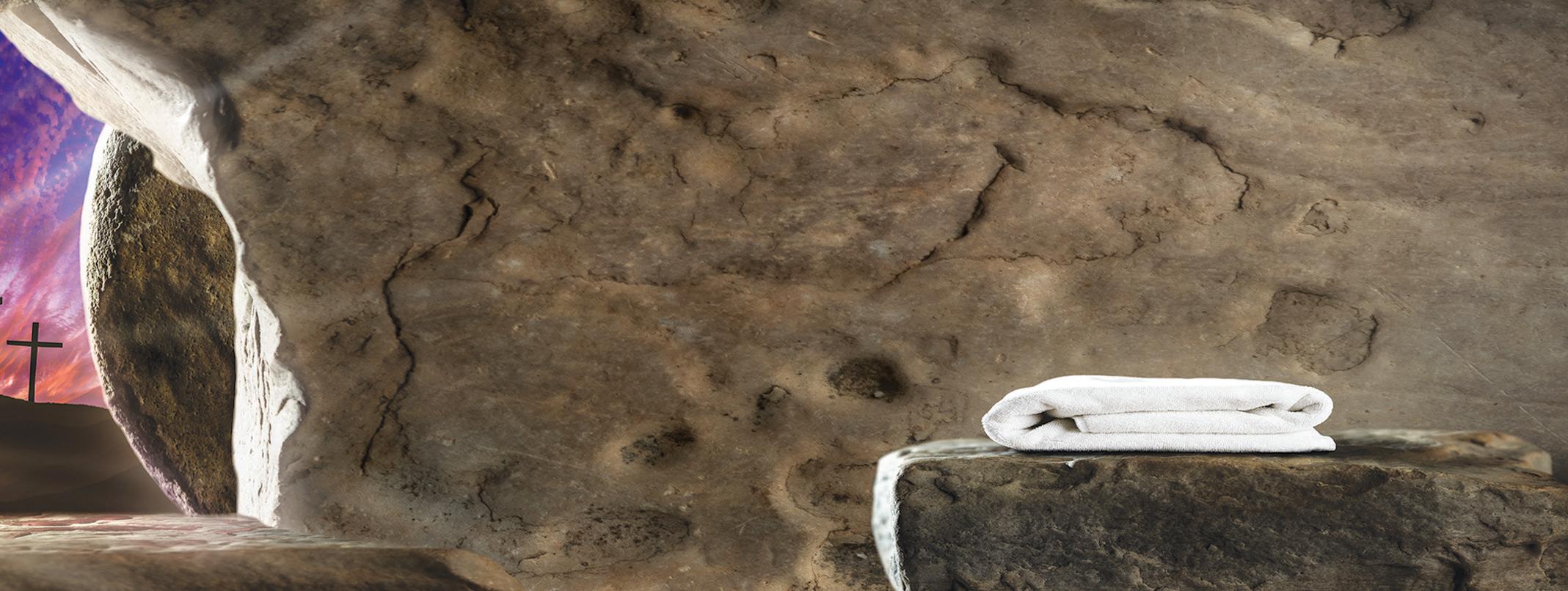
“But now
is Christ risen from the dead” (1 Corinthians 15:20).
Paul loved to use the expression, “but now.” He used it 18 times in the New Testament (1 Corinthians 12:18, 20; 15:20; 2 Corinthians 8:22; 12:6; Galatians 4:9; Ephesians 2:13; 5:8; Philippians 2:12; Colossians 1:26; 3:8; 2 Timothy 1:10; Philemon 11; Hebrews 2:8; 8:6; 9:26; 11:16; 12:26). When he did, he used it as an equivalent to the military terms, “About face!” or “To the rear, march!” He was in essence saying, “Turn around 180 degrees – about face!”
For instance, Paul wrote:
That at that time ye were without Christ, being aliens from the commonwealth of Israel, and strangers from the covenants of promise, having no hope, and without God in the world: But now in Christ Jesus ye who sometimes were far off are made nigh by the blood of Christ (Ephesians 2:12-13) emphasis added.
About face! And again, he wrote: “For ye were sometimes darkness, but now are ye light in the Lord: walk as children of light” (Ephesians 5:8). About face! He further
wrote: “Wherefore, my beloved, as ye have always obeyed, not as in my presence only, but now much more in my absence, work out your own salvation with fear and trembling (Philippians 2:12). About Face!
Some were saying there is no physical resurrection of the dead. Logically, therefore, the Messiah was not resurrected. The end result of such thinking is hopelessness and despair. Paul’s triumphant response was: “But now is Christ risen from the dead, and become the firstfruits of them that slept” (1 Corinthians 15:20). About face! When Paul used the term “firstfruits” – the first sheaf of barley harvest to ripen – he was harkening back to the third feast of the Lord (Leviticus 23:10). When God accepted the firstfruits, it became the earnest, or assurance, that the rest of the crop would come up out of the ground. Christ himself is the firstfruits (1 Corinthians 15:23).
In both the Old and New Testaments there were people who were raised from the dead (1 Kings 17:17-23; 2 Kings 4:18-37; Luke 8:54-55; John 11:43-44). In time, however, those who were raised died again. Jesus was the first to be resurrected from the grave, never to die again. He alone is the firstfruits – the guarantee that the rest of the harvest will come out of the ground.
The feast of Passover spoke of Messiah’s death as a sacrificial and substitutionary lamb.
The Feast of Unleavened Bread indicated that His body would not decay while in the grave.
The Feast of Firstfruits proclaims that death could not hold its Foe. “Up from the grave He arose, with a mighty triumph o’er His foes.” Because He lives, all men and women of faith will live – forever.
shall ye number fifty days; and ye shall offer a new meat offering unto the Lord. Ye shall bring out of your habitations two wave loaves of two tenth deals: they shall be of fine flour; they shall be baken with leaven; they are the firstfruits unto the Lord (Leviticus 23:15-17).
The fourth feast is known as Shavuot (Hebrew), or more popularly “The Feast of Weeks.” It is called the Feast of Weeks because God specifically told the Jewish people they were to count seven weeks from Firstfruits, which is 49 days, for the observance of this fourth feast (Leviticus 23:15; Deuteronomy 16:9). And then on the following day (“on the morrow”) this fourth feast was to be observed (Leviticus 23:16). Seven weeks of days are 49 days. Add one day (as the Bible does) and it brings the total to 50 days.
This fourth feast was to occur precisely 50 days after Firstfruits. This feast is also called Pentecost (Acts 2:1), meaning 50. It was so named because it occurs exactly 50 days after Firstfruits, which depicts Christ’s resurrection.
On this occasion, the children of Israel were not simply to bring the firstfruits of the wheat harvest to the Temple (as they brought the firstfruits of the barley at the Feast of Firstfruits), but two loaves of bread. These two loaves of bread were to be baked with fine flour and leaven.
The fourth feast is known as
or more popularly “The Feast of Weeks.”
And ye shall count unto you from the morrow after the sabbath, from the day that ye brought the sheaf of the wave offering; seven sabbaths shall be complete: Even unto the morrow after the seventh sabbath
Fifty days, two loaves instead of simply the first sheaf of barley and two loaves with leaven; what did it all mean? It all pointed to the coming of the Holy Spirit at Pentecost and the beginning of the Church Age. The Son of God arose from the grave on Firstfruits – the very day. He then spent 40 days with His disciples in postresurrection ministry (Acts 1:3). He informed them it was necessary He ascend to His Father (there as our High Priest to apply the benefits of His once-and-for-all sacrifice for our sin), but that He would not abandon them. He would send them His Holy Spirit who would come alongside to help in His absence (John 14:16-17).
This fourth feast was to occur precisely 50 days after Firstfruits.
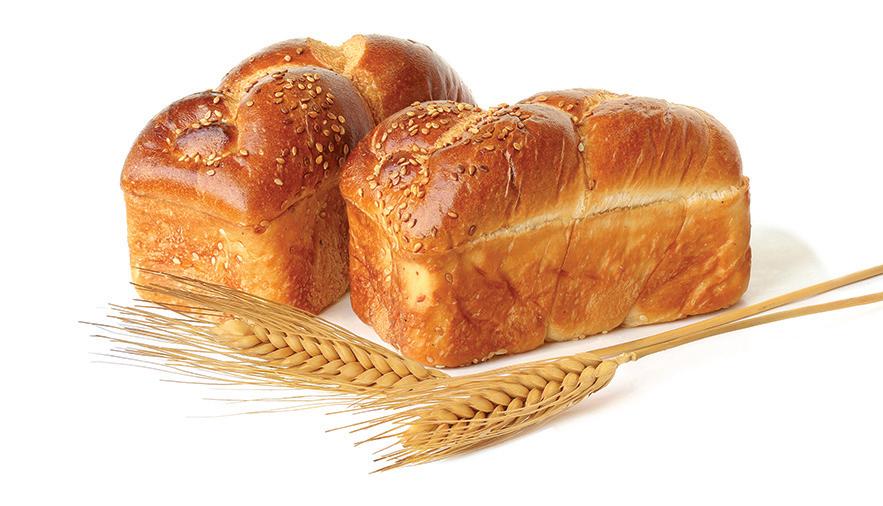
. . . two loaves instead of simply the first sheaf of barley and two loaves with leaven; what did it all mean? It all pointed to the coming of the Holy Spirit at Pentecost and the beginning of
The Lord commanded them to tarry at
For he is our who hath made both [Jew and Gentile] one, and hath broken down the middle wall of partition . . . to make in himself of twain one new main, so making (Ephesians 2:14-15).
Jerusalem until He came with these words:
And, being assembled together with them, commanded them that they should not depart from Jerusalem, but wait for the promise of the Father, which, saith he, ye have heard of me. For John truly baptized with water; but ye shall be baptized with the Holy Ghost not many days hence (Acts 1:4-5).
They waited as they were commanded. Their wait was not long – 10 days. They knew how many days they had to wait. The fourth feast was exactly 50 days from the third feast of the Lord. The Lord ministered 40 days from His resurrection to His ascension. Pentecost would be 10 days later. Jesus died at Passover. He was placed in the grave, and His body did not decay on the Feast of Unleavened Bread. He arose on Firstfruits, and He sent His Holy Spirit on Pentecost. It happened right on schedule. The Spirit of God descended on those first-century believers right on schedule (Acts 2:1-4).
For the Feast of Weeks, two loaves of bread were brought to the Temple. The two loaves represented Jew and Gentile, now one in the Messiah with the coming of the Holy Spirit. Writing to the Ephesian believers, Paul said: “For he is our peace, who hath made both [Jew and Gentile] one, and hath broken down the middle wall of partition … to make in himself of twain one new man, so making peace” (Ephesians 2:14-15).
There was to be leaven in those two loaves, for believers have not yet been glorified. During this age, there is still sin within the Church. Positionally, in the Savior, the Church is perfected. Practically, or experientially, she still has a long way to go before being glorified. The Church, the body of Christ, still has leaven within her. Therefore, leaven was to be included in two loaves presented to God at Pentecost.
Passover speaks of redemption. Messiah –the Passover Lamb – has been slain for us.
Unleavened Bread speaks of sanctification. He was set apart. Unlike all other men, His body would not decay in the grave. He would not see corruption.
Firstfruits speaks of resurrection. Death could not hold its Foe. On the third day,
Jesus rose triumphantly from the grave.
The Feast of Weeks speaks of origination. The coming of the Holy Spirit at Pentecost inaugurated the New Covenant and Church Age which Jesus instituted in the Upper Room (Matthew 26:28-29). The middle wall of separation between Jews and Gentiles has been broken down. From the two, the Lord is calling out the Church, which is His body (Ephesians 2:13-17).
Each major event of the Messiah’s first coming occurred on the precise date of the appropriate Jewish holiday.
■ He was crucified on Passover.
■ He was placed in the grave on the Feast of Unleavened Bread.
■ He was resurrected on the Feast of Firstfruits.
■ He ascended to His Father and 10 days later sent the Holy Spirit on Pentecost.
Each of the three major events to be associated with His second coming will, likewise, fall on the appropriate Jewish holiday. Those three feasts – Trumpets, the Day of Atonement, and Tabernacles unerringly point to the Rapture of the Church (Trumpets), the salvation of Israel (Day of Atonement), and the establishment of His Messianic Kingdom (Tabernacles).
Each of the first four feasts or divine appointments literally occurred during Christ’s first coming in the spring of the year.
Each of the last three feasts or divine appointments will literally occur at Christ’s second coming during the fall of the year.
In between the spring feasts – which occurred almost 2,000 years ago – and the fall feasts – which, I believe, will soon occur –is a period known biblically as the Times of the Gentiles, also referred to as the Church Age, during which we are now living. u
To understand the significance of the three fall feasts and how all seven fit together exquisitely, read the very next article in this issue of Zion’s Fire . . .
 Continued by Marvin J. rosenthal
Continued by Marvin J. rosenthal
The redemptive work of Christ associated with His first coming, which the four spring feasts depict, is history. We can look back at those events, and they can be examined as historical facts.
In contrast, the three fall feasts have not yet been fulfilled. They predict, with absolute certainty, events yet to unfold. As the four spring holidays were fulfilled literally and right on schedule in connection with Messiah’s first coming, the three fall holidays will likewise be fulfilled literally and right on schedule in connection with His second coming. These seven feasts are at the very heart of prophecy.
The Feast of Trumpets is the first of the fall feasts. It is called Rosh
And the Lord spake unto Moses, saying, Speak unto the children of Israel, saying, In the seventh month, in the first day of the month, shall ye have a sabbath, a memorial of blowing of trumpets, an holy convocation. Ye shall do no servile work therein: but ye shall offer an offering made by fire unto the Lord (Leviticus 23:23-25).
The Feast of Trumpets is the first of the fall feasts. It is called Rosh Hashanah by the Jewish people. Rosh Hashanah literally means “Head of the Year” or “New Year.” It is celebrated at the start of the civil year, which on the Jewish calendar occurs on the first day of the month of Tishri, which corresponds on our calendar to sometime between September and October. In contrast, the religious year starts on the 14th of the Jewish month of Nisan at Passover, which corresponds on our calendar to sometime in March or April.
It is important to note that the designation Rosh Hashanah was never given to the Feast of Trumpets in the Bible. In the Scriptures, the holiday is simply referred to
The Feast of Trumpets is so important in Jewish thinking that it stands alongside Yom Kippur (the Day of Atonement) to comprise what Judaism calls not simply “holy days” but
“high holy days.”
as Zikhron Teruah (meaning, “Memorial of Blowing [of trumpets]” Leviticus 23:24) and Yom Teruah (meaning, “Day of Blowing [of trumpets]” Numbers 29:1). This is the only one of the seven holidays which centers on a musical instrument. The idea of associating the Feast of Trumpets with the Jewish New Year began following the destruction of the Temple in A.D. 70 more than 1,500 years after its inception during the time of Moses.
The Feast of Trumpets is so important in Jewish thinking that it stands alongside Yom Kippur (the Day of Atonement) to comprise what Judaism calls not simply “holy days” but “high holy days.”
The interval of time between the last of the spring feasts (Pentecost) and the first of the fall feasts (Trumpets) corresponds to this present age. Put another way, we are



The blowing of the trumpet in ancient Israel had two primary functions.
The first . . . was to call a solemn assembly . . .
The second . . . was to go to war.
of the Holy Spirit at Pentecost (Acts 2:2-4) inaugurated the Church. Trumpets will signal Messiah’s second coming to rapture the Church and judge the wicked.
In Israel’s religious ritual, she utilized two different kinds of trumpets. One was long, flared, and made of seamless silver. The other trumpet was a ram’s horn, commonly called the “shofar.” The blowing of the trumpet in ancient Israel had two primary functions. The first was to call a solemn assembly; that is, when the children of Israel were to be summoned to God’s presence, the trumpet was blown:
And the Lord spake unto Moses, saying, Make thee two trumpets of silver; of a whole piece shalt thou make them: that thou mayest use them for the calling of the assembly, and for the journeying of the camps. And when
they shall blow with them, all the assembly shall assemble themselves to thee at the door of the tabernacle of the congregation. And if they blow but with one trumpet, then the princes, which are heads of the thousands of Israel, shall gather themselves unto thee (Numbers 10:1-4).
The second, primary reason for blowing the trumpet was when Israel, under divine direction, was to go to war:
And if ye go to war in your land against the enemy that oppresseth you, then ye shall blow an alarm with the trumpets; and ye shall be remembered before the Lord your God, and ye shall be saved from your enemies (Numbers 10:9; Jeremiah 4:19-21; Joel 2:1).
To illustrate that point, note that Joshua blew the shofar in the conquest of Jericho: And ye shall compass the city, all ye men of war, and go round about the city once. Thus shalt thou do six days. And seven priests shall bear before the ark seven trumpets of rams’ horns: and the seventh day ye shall compass the city seven times, and the priests shall blow with the trumpets. And it shall come to pass, that when they make a long blast with the ram’s horn, and when ye hear the sound of the trumpet, all the people shall shout with a great shout; and the wall of the city shall fall down flat, and the people shall ascend up every man straight before him … And it came to pass at the seventh time, when the priests blew with the trumpets, Joshua said unto the people, Shout; for the Lord hath given you the city (Joshua 6:3-5; 16, emphasis added).
In similar fashion, Gideon blew the trumpet in the battle with the Midianites:
And he divided the three hundred men into three companies, and he put a trumpet in every man’s hand, with empty pitchers, and lamps within the
pitchers. And he said unto them, Look on me, and do likewise: and, behold, when I come to the outside of the camp, it shall be that, as I do, so shall ye do. When I blow with a trumpet, I and all that are with me, then blow ye the trumpets also on every side of all the camp, and say, The sword of the Lord, and of Gideon. So Gideon, and the hundred men that were with him, came unto the outside of the camp in the beginning of the middle watch; and they had but newly set the watch: and they blew the trumpets, and brake the pitchers that were in their hands (Judges 7:16-19, emphasis added).
And not to be outdone, Nehemiah, while rebuilding the walls of Jerusalem, commanded that the trumpet be blown in the event of attack:
And it came to pass from that time forth, that the half of my servants wrought in the work, and the other half of them held both the spears, the shields, and the bows, and the habergeons; and the rulers were behind all the house of Judah. They which builded on the wall, and they that bare burdens, with those that laded, every one with one of his hands wrought in the work, and with the other hand held a weapon. For the builders, every one had his sword girded by his side, and so builded. And he that sounded the trumpet was by me. And I said unto the nobles, and to the rulers, and to the rest of the people, The work is great and large, and we are separated upon the wall, one far from another. In what place therefore ye hear the sound of the trumpet, resort ye thither unto us: our God shall fight for us (Nehemiah 4:16-20, emphasis added).
The prophets of Israel repeatedly spoke of a future day when God would directly intervene in the affairs of men. They called that day the Day of the Lord (Isaiah 13:6-13; Ezekiel 13:3-8; 30:2-3; Joel 1:15; 3:14-16; Amos 5:18-20; Zephaniah 1:14-2:3; Zechariah 14:1-4; Malachi 4:5-6). The Day
The prophets of Israel repeatedly spoke of a future day when God would directly intervene in the affairs of men… they called that day the it begins with the Day of the Lord... blowing of the trumpet.
of the Lord begins with the blowing of the trumpet, and then two events quickly follow.
The first will be the deliverance of the righteous by rapture. The second will be the judgment of the wicked. The trumpet will be blown and the Messiah will call His redeemed children to Himself through resurrection or rapture and then go to war against His enemies.
Concerning His coming, the Lord Jesus taught:
Immediately after the tribulation of those days shall the sun be darkened, and the moon shall not give her light, and the stars shall fall from heaven, and the powers of the heavens shall be shaken: And then shall appear the sign of the Son of man in heaven: and then shall all the tribes of the earth mourn, and they shall see the Son of man coming in the clouds of heaven with power and great glory. And he shall send his angels with a great sound of a trumpet, and they shall gather together his elect from the four winds, from one end of heaven to the other (Matthew 24:29-31, emphasis added).
Writing to the Corinthians concerning the second coming of Christ, the apostle Paul encouraged the believers with these words:
Behold, I shew you a mystery; We shall not all sleep, but we shall all be changed, In a moment, in the twinkling of an eye, at the last trump: for the trumpet shall sound, and the dead
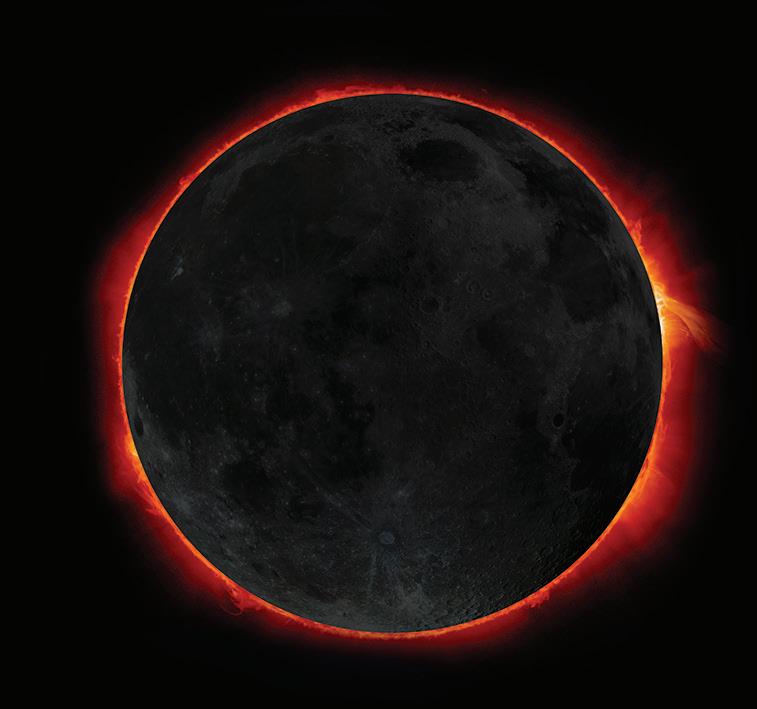
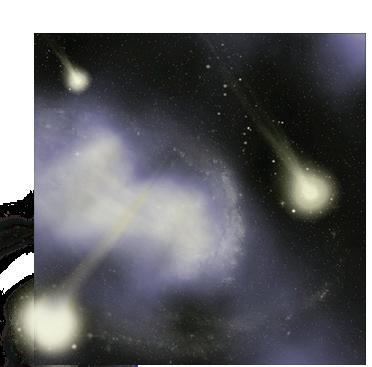
Immediately after the tribulation of those days shall the sun be darkened, and the moon shall not give her light, and the stars shall fall from heaven, and the powers of the heavens shall be shaken . . .
… For this corruptible must put on incorruption, and this mortal must put on immortality (1 Corinthians 15:51-53).
For if we believe that Jesus died and rose again, even so them also which sleep in Jesus will God bring with him (1 Thessalonians 4:14).
shall be raised incorruptible, and we shall be changed [at the Rapture]. For this corruptible must put on incorruption, and this mortal must put on immortality (1 Corinthians 15:51-53, emphasis added).
In the classic rapture text, Paul wrote:
But I would not have you to be ignorant, brethren, concerning them which are asleep, that ye sorrow not, even as others which have no hope. For if we believe that Jesus died and rose again, even so them also which sleep in Jesus will God bring with him. For this we say unto you by the word of the Lord, that we which are alive and remain unto the coming of the Lord shall not prevent [precede] them which are asleep. For the Lord himself shall descend from heaven with a shout, with the voice of the archangel, and with the trump of God: and the dead in Christ shall rise first: Then we which are alive and remain shall be caught up together with them in the clouds to meet the Lord in the air: and so shall we ever be with the Lord (1 Thessalonians 4:13-17, emphasis added).
Rapture of the Church. In response, note the following observations, to which many more could be added:
. . . Paul writes of Christ’s going to war during the
For yourselves know perfectly that the day of the Lord so cometh as a thief in the night . . .
Immediately following his comments on the Rapture, Paul writes of Christ’s going to war during the Day of the Lord:
For yourselves know perfectly that the day of the Lord so cometh as a thief in the night. For when they [the unsaved] shall say, Peace and safety; then sudden destruction cometh upon them [the unsaved], as travail upon a woman with child; and they [the unsaved] shall not escape (1 Thessalonians 5:2-3).
In the most basic terms, the Feast of Trumpets, the first of the three fall feasts, depicts the coming of the Messiah to rapture the Church and judge the wicked. Some argue that these feasts were given to Israel, not the Church; therefore, the Feast of Trumpets cannot depict the
The Feast of Passover was given to Israel, but it depicts the Messiah’s death on Calvary for the sins of the world. Clearly, its provision goes beyond only Israel.
The Feast of Unleavened Bread was given to Israel, but it depicts the fact that the Lord’s body would not decay in the grave; again, crucial Church doctrine.
The Feast of Firstfruits was given to Israel. However, it depicts the Lord’s triumphant resurrection. It is because He lives that believers will also live.
The Feast of Weeks (Pentecost) was given to Israel, but it depicts the birth of the Church through the New Covenant. Believing Jews and believing Gentiles become one in the Messiah.
The Abrahamic Covenant (Genesis 12:1-3) was made with the father of the Jewish nation, but it is the source and wellspring of every blessing the Church possesses. God said to Abraham, “In thee shall all families of the earth be blessed.”
The Davidic Covenant (2 Samuel 7:8-16) was made with Israel’s king, but it is the basis of the Messiah’s return as the Son of David and Lion of the tribe of Judah to take His rightful throne as the King of kings and Lord of lords.
The New Covenant was made with Israel (Jeremiah 31:31); but the Church has entered into its provision for salvation (Matthew 26:28).
The Lord’s Table was initiated with the elements of the Jewish Passover table and with Jewish disciples, but it is one of the ordinances of the Church.
The command to evangelize the world was given to 11 Jewish disciples (Matthew 28:16-20), but it is commonly
known as the Great Commission of the Church.
The Church is built upon the foundation of the apostles and prophets, Jesus Christ himself being the Chief Cornerstone (Ephesians 2:20).
The apostles were Jewish, the prophets were Jewish, and the Savior was Jewish. Covenant theology – which confuses and blurs the distinction between Israel and the Church – and replacement theology –which vainly attempts to have the Church stand in the place of Israel – has built a chasm between Israel and the Church which the Bible never sanctions.
Israel and the Church are distinct entities. The Church is not Israel, and Israel is not the Church. There are promises made to both. It is equally clear, however, that there is a contiguous relationship between Israel and the Church. Every blessing which the Church enjoys comes out of covenants and provisions God made with Israel. Therefore, it should not seem strange or unusual that the Feast of Trumpets, which the Lord gave to Israel, should depict the Rapture of the Church (made up of Jew and Gentile) immediately prior to the outpouring of God’s wrath during the Day of the Lord.
Perhaps one further thought is appropriate at this point. The Feast of Trumpets occurs on the first day of the Hebrew month Tishri. It occurs at the new moon when only the slightest crescent is visible. However, clouds could easily obscure the new moon. Therefore, two witnesses were required in ancient days to substantiate a new moon.
Watchfulness was a critical ingredient of this feast. The rabbis later added a second day to this feast to make sure they did not miss it. This need for watchfulness and preparedness in connection with the Feast of Trumpets – which depicts the Rapture of the Church – is echoed and reechoed throughout the New Testament in connection with Messiah’s coming.
The Lord taught, “Watch therefore: for ye know not what hour your Lord doth come” (Matthew 24:42, emphasis added).
“Watch therefore: for ye know not what hour your Lord doth come” (Matthew 24:42).

Paul taught, “Therefore let us not sleep, as do others; but let us watch and be sober” (1 Thessalonians 5:6, emphasis added).
Again Paul taught, “Looking for that blessed hope, and the glorious appearing of the great God and our Saviour Jesus Christ” (Titus 2:13, emphasis added).
The author of Hebrews taught, “So Christ was once offered to bear the sins of many; and unto them that look for him shall he appear the second time without sin unto salvation” (Hebrews 9:28, emphasis added).
Therefore let us not sleep, as do others; but let us watch and be sober (1 Thessalonians 5:6).
Looking for that blessed hope, and the glorious appearing of the great God and our Saviour Jesus Christ
And the apostle Peter taught:
Looking for and hasting unto the coming of the day of God, wherein the heavens being on fire shall be dissolved, and the elements shall melt with fervent heat? Nevertheless we, according to his promise, look for new heavens and a new earth, wherein dwelleth righteousness. Wherefore, beloved, seeing that ye look for such things, be diligent that ye may be found of him in peace, without spot, and blameless (2 Peter 3:12-14, emphasis added).
(titus 2:13).
Wherefore, beloved, seeing that ye look for such things, be diligent that ye may be found of him in peace, without spot, and blameless (2 Peter 3:14).
. . . I can think of nothing more futile or frustrating than to be looking for something that is “signless” and “at any moment”; and such must be the case for those who believe in a Pretribulation Rapture of the Church.
I only mean to be helpful – God knows my heart, when I say I can think of nothing more futile or frustrating than to be looking for something that is “signless” and “at any moment”; and such must be the case for those who believe in a Pretribulation Rapture of the Church.
And the Lord spake unto Moses, saying, Also on the tenth day of this seventh month there shall be a day of atonement: it shall be an holy convocation unto you; and ye shall afflict your souls, and offer an offering made by fire unto the Lord. And ye shall do no work in that same day: for it is a day of atonement, to make an atonement for you before the Lord your God (Leviticus 23:26-28).

According to Jewish tradition, three books are opened in Heaven on the Feast of Trumpets.
Whereas Trumpets occurred on the first day of Tishri at the New Moon, the Day of Atonement occurred nine days later on the 10th of the same month. The 10 days from Trumpets to the Day of Atonement are called by the rabbis “The Days of Awe.”
According to Jewish tradition, three books are opened in Heaven on the Feast of Trumpets. One is the Book of Life for the righteous. The second is the Book of Life for the unrighteous. The third is the Book of Life for those in-between.
■ If a person is deemed to be “righteous” at the Feast of Trumpets, their name is written in the Book of Life for the righteous for the coming year.
■ If a person is deemed “unrighteous,” their name is written in the Book of Life for the unrighteous, and they will not survive the coming year.
■ If a person is deemed “in-between,” judgment is delayed from the Feast of Trumpets to the Day of Atonement.
It is during that period of time they are given the opportunity to repent before the book is closed and their destiny sealed. This tradition, though greatly embellished, finds its origin in Scripture. King David wrote, “Let them be blotted out of the book of the living, and not be written with the righteous” (Psalm 69:28).
And Moses pleaded to God on Israel’s behalf: “Yet now, if thou wilt forgive their sin –; and if not, blot me, I pray thee, out of thy book which thou hast written. And the Lord said unto Moses, Whosoever hath sinned against me, him will I blot out of my book” (Exodus 32:32-33).
In the New Testament, this concept is also hinted at in the context of the Great White Throne Judgment. The apostle John wrote:
And I saw the dead, small and great, stand before God; and the books were opened: and another book was opened, which is the book of life: and the dead were judged out of those things which were written in the books, according to their works (Revelation 20:12).
On the first day of the Ten Days of Awe, observant Jews will make their way to a body of water. It may be an ocean, river, lake, or pond. In Israel, it may be the Mediterranean Sea, the Sea of Galilee, the Jordan River, or even a well. There they will recite a prayer called Tashlikh. It is a compilation of Micah 7:18-20, Psalm 118:5-9, Psalm 33, and Psalm 130. It is a time for calling on God for mercy and forgiveness before the books are closed for another year.
The actual name of the Hebrew prayer means “you will cast.” Observant worshipers will open their pockets in an attempt to empty – or “cast” – any crumbs in their pockets into the water.
Since bread crumbs (leaven) speak of sin, they are symbolically casting their sin into

“Thou wilt cast
all their sins into the depths of the sea” (Micah 7:19).
the water. This practice is based on the biblical injunction “Thou wilt cast all their sins into the depths of the sea” (Micah 7:19). Water is a reflector of light. The deeper the water the less the light; the idea is that in the depths of the sea God no longer sees our sin.
I am strongly convinced that at the Feast of Trumpets, in September or October of an unknown future year, the Church will be raptured and the Day of the Lord wrath will commence upon the earth. The outpouring of the Lord’s wrath will occupy a relatively brief period of time, perhaps a year to 18 months, encompassing the trumpet judgments of Revelation (the fifth trumpet judgment alone is five months in duration, Revelation 9:5).
At Jesus’ physical return to the earth, many Jews who survived the Lord’s purging of the earth will be saved. The prophet Zechariah wrote of that event:
And it shall come to pass in that day, that I will seek to destroy all the nations
that come against Jerusalem. And I will pour upon the house of David, and upon the inhabitants of Jerusalem, the spirit of grace and of supplications: and they shall look upon me whom they have pierced, and they shall mourn for him, as one mourneth for his only son, and shall be in bitterness for him, as one that is in bitterness for his firstborn (Zechariah 12:9-10).
Paul, in speaking to Gentile believers concerning Israel at the end of the age, wrote:
For I would not, brethren, that ye should be ignorant of this mystery, lest ye should be wise in your own conceits; that blindness in part is happened to Israel, until the fulness of the Gentiles be come in. And so all Israel shall be saved: as it is written, There shall come out of Sion the Deliverer, and shall turn away ungodliness from Jacob (Romans 11:25-26).
And so all Israel shall be saved: as it is written, There shall come out of and shall
Sion theDeliverer, turn away ungodliness fromJacob
(Romans 11:26).
Water is a reflector of light. The deeper the water the less the light; the idea is that in the depths of the sea God noseeslonger our sin.
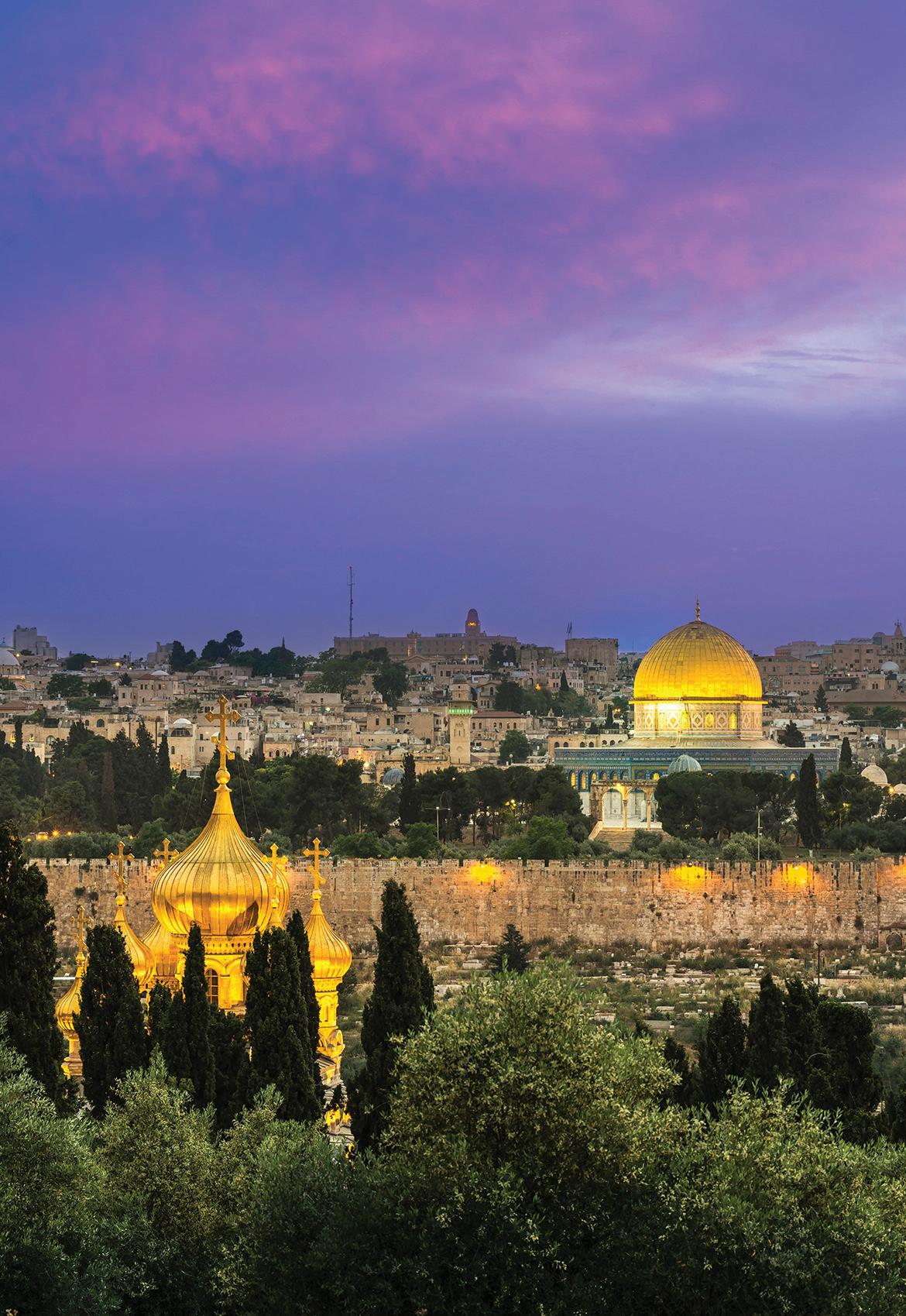
At Jesus’ physical return to the earth, many Jews who survived the Lord’s purging of the earth will be saved.
The expression “all Israel” is speaking of those Jews who survive until Christ returns at the end of the age. They will turn to Christ.
This text does not refer to all Jews throughout the ages. The expression “all Israel” is speaking of those Jews who survive until Christ returns at the end of the age. They will turn to Christ.
Israel’s Day of Atonement required the shedding of blood. But with the destruction of the Temple in A.D. 70, Israel’s priesthood and sacrificial system came to an abrupt end and with it the offering of sacrifices. What could they now do in light of the clear biblical injunction that “it is the blood that
should have realized that Jesus, Son of Abraham and Son of David, was their once-and-for-all sacrifice for sin. Instead, they followed the lead of Rabbi Yohanan and substituted Mitzvahs (good deeds) for sacrifice. Later, the Jews added prayer and fasting to good deeds as the way to obtain acceptance before God. In so doing, they renounced their patriarch, Abraham, who “‘believed’ in the Lord; and he counted it [his belief or “faith”] to him for righteousness” (Genesis 15:6).
Israel’s Day of Atonement required the
But with the destruction of the Temple in A.D.70, Israel’s priesthood and sacrifical system came to an abrupt end . . .
“it is the blood that maketh an atonement for the soul” (Leviticus 17:11).
Be not grieved, we have another atonement as effective as this. And what is it? It is acts of loving-kindness, as it is said, ‘For I desired mercy and not sacrifice’ (Hosea 6:6),
maketh an atonement for the soul” (Leviticus 17:11)?
Jewish history records that shortly after the Roman destruction of the Temple, as Rabbi Yohanan Ben Zakkai was leaving Jerusalem, Rabbi Joshua followed after him and lamented the Temple ruins and cried that “this, the place where the iniquities of Israel were atoned for is laid waste!” “My son,” Rabbi Yohanan said to him, “Be not grieved, we have another atonement as effective as this. And what is it? It is acts of loving-kindness, as it is said, ‘For I desired mercy and not sacrifice’ [Hosea 6:6]” (Avot De Rabbi Nathan 4:18).
One rabbi, without warrant, and taking a biblical text totally out of context changed the religious course of the Jewish people for the past 2,000 years.
With the destruction of their Temple, priesthood, and sacrificial system, they
As a Jewish youngster, I can vividly remember a ritual my orthodox Jewish grandmother observed each year as the Day of Atonement approached. She would take me by the hand to a local store in our Jewish neighborhood and purchase a healthylooking, live chicken without outward spot or blemish.
With the chicken in one hand and me hanging onto the other, she would enter a room in the back of the store. There, a man called a Shochet, trained in the rabbinic laws for slaughtering animals, was waiting. My grandmother would grab the chicken in her left hand and place her right hand on its head. She would then wave the chicken over her head three times while pronouncing these words: “This is my substitute, my vicarious offering, my atonement. This fowl shall meet death, but I shall enjoy a long, happy life and peace.” The chicken was then killed by the Shochet, as a substitute for my grandmother’s sin.
Today, very, very few orthodox Jews observe this custom. But it is a testimony to the fact that in olden days many orthodox Jews knew that God required a sacrifice for sin – they understood that good deeds, prayer, and fasting could not atone for their sin.
This day will not only be Israel’s Day of Atonement. From amongst the nations
. . . it is a testimony to the fact that in olden days many orthodox Jews knew that they understood that good deeds, prayer, and fasting could not atone for their sin.
God required a sacrifice for sin-
of the world, many individuals will not take the mark of the Antichrist referred to in Revelation 13:16. And when the Lord Jesus returns to Earth, many will repent of their sins before the Book of Life is forever closed. The Lord had these Gentiles in mind in His Olivet Discourse. He taught:
When the Son of man shall come in his glory, and all the holy angels with him, then shall he sit upon the throne of his glory: And before him shall be gathered all nations: and he shall separate them one from another, as a shepherd divideth his sheep from the goats: And he shall set the sheep on his right hand, but the goats on the left. Then shall the King say unto them on his right hand, Come, ye blessed of my Father, inherit the kingdom prepared for you from the foundation of the world (Matthew 25:31-34).
It is this multitude from among the nations, along with those from among the sons of Jacob, who will enter the messianic Kingdom still in mortal bodies (distinct from the raptured and glorified Church which will inhabit New Jerusalem). In the end, they will both, Jew and Gentile, be saved by grace through faith apart from works.
THE OF
And the Lord spake unto Moses, saying, Speak unto the children of Israel, saying, The fifteenth day of this seventh month shall be the feast of tabernacles for seven days unto the Lord. And ye shall take you on the first day the boughs of goodly trees, branches of palm trees, and the boughs of thick trees, and willows of the brook; and ye shall rejoice before the Lord your God seven days. And ye shall keep it a feast unto the Lord seven days in the year. It shall be a statute for ever in your generations: ye shall celebrate it in the seventh
month. Ye shall dwell in booths seven days; all that are Israelites born shall dwell in booths (Leviticus 23:33-34, 40-42).
On the 15th of Tishri, the seven-day Feast of Tabernacles begins. It is the seventh and final feast and usually occurs in October. Observant Jews erect little huts, or booths, from bulrushes and palm branches as a reminder of the temporary housing erected by their forefathers during the Exodus wanderings.

At Tabernacles, also known as the “Feast of Ingathering,” samples of the fall crop (produce such as dates and pomegranates) are hung in each family’s booth to acknowledge God’s faithfulness in providing for His people (Exodus 23:16).
Each day of the seven-day Feast of Tabernacles was filled with joy and important festivity. On the last day of the feast, the High Priest of Israel, in a great processional made up of priests and tens of thousands of worshipers, descends from the Temple Mount to pause briefly at the Pool of Siloam. There, he fills a pitcher of water, and the procession returns back to the Temple Mount through the Water Gate.
The High Priest then makes his way to the great stone altar. He pours the water out of the pitcher into a silver basin which drains to the base of the altar.
In Israel, the “latter” rains normally stop in March, and there is no rain until late October or November, a period of almost seven months. If God does not provide the “early” rains to break up the hard soil, there will be no spring crop, and famine will be at the doorstep. This water ceremony, at the Temple, was intended to invoke God’s blessing on the nation and provide lifegiving water.
It is in connection with the Feast of Tabernacles that the Gospel of
Observant Jews erect little huts, or booths, from bulrushes and palm branches as a reminder of the temporary housing erected by their forefathers during the
Each day of the seven-day Feast of Tabernacles was filled with joy and important festivity.
This water ceremony at the Temple, was intended to invoke on the nation and provide life-giving water.
God’s blessing

John records a fascinating event. John wrote: “In the last day, that great day of the feast [of Tabernacles], Jesus stood and cried, saying, If any man thirst, let him come unto me, and drink. He that believeth on me, as the scripture hath said, out of his belly shall flow rivers of living water” (John 7:37-38). This, we are told, Jesus spoke concerning the Holy Spirit (John 7:39). Not only could He provide “water,” but He could provide “living water.”
If any man thirst, let him come unto me, and drink. He that believeth on me, as the scripture hath said, out of his belly shall flow
rivers of living water (John 7:37-38).
In Israel there are three primary sources of water. There is water from a cistern, but it can leak out or become stagnant and go bad. There is water from a well, but sometimes a well can dry up. And there is “living water”: moving water that never goes bad or dries up. It is like the Jordan River. It is this last kind of water that Jesus freely provides. The Son of God was saying in the clearest possible way that He alone is the source of life and blessing; He alone can provide “living” water.
The Feast of Tabernacles speaks eloquently of the Messianic Kingdom, of a new beginning without the ravages of the curse of sin. In that day, the earth will give her full bounty, all animals will be docile, armies will no longer march, graves will not have to be dug, and every man will sit under his own fig tree (satisfied and fulfilled in every way), and truth and righteousness will be a reality in the earth.
 Written by Marvin J. rosenthal
Written by Marvin J. rosenthal
The seven feasts foretold the major redemptive work of the Messiah’s life approximately 1,500 years before His birth. Only a God who is not bound by time and knows all things before they come to pass could have foretold these astounding events.
Soon, very soon, the trumpet will sound the final blast of this age, signaling Christ’s coming. The dead in Christ will be resurrected. The living in Christ will be raptured. And the long night will revolve into a glorious new day for all those who have
accepted His invitation and attended His appointed times.
The four spring feasts relate to His first coming:
■ In Passover, His vicarious, sinless, substitutionary death is depicted.
■ The Feast of Unleavened Bread testifies to the reality that, as the Lamb of God, His body would not decay in the grave.
■ The Feast of Firstfruits illustrates that death could not hold Him prisoner; His body would not remain in the grave.
■ The Feast of Weeks commemorates the coming of the Holy Spirit and the birthday of the Church.
The three fall feasts portray events associated with His second coming:
■ The Feast of Trumpets depicts Christ’s coming and the Rapture of the Church.
■ The Day of Atonement points to a great host of people, Jews and Gentiles, who will not take the mark of the Antichrist and will be saved in connection with the Lord’s second coming.
■ The Feast of Tabernacles speaks of the day when the Messiah himself will tabernacle amongst the human race, wipe away every tear, and bring in the Millennial (1,000-year) Kingdom which humanity has dreamed of since time immemorial.
Even so, come Lord Jesus.
Full-Color Illustrations
224 Pages
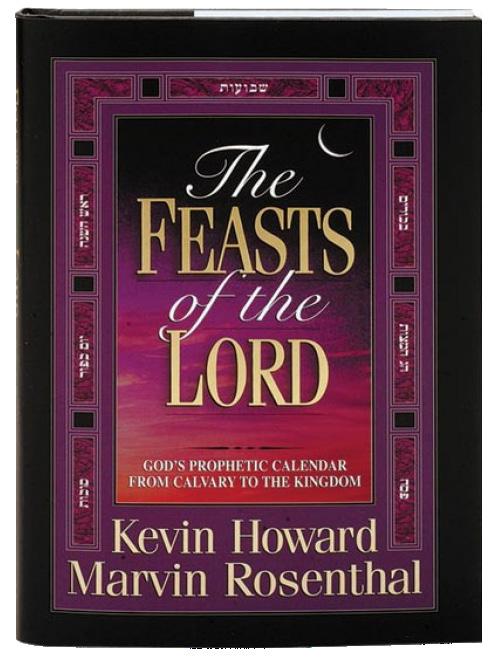
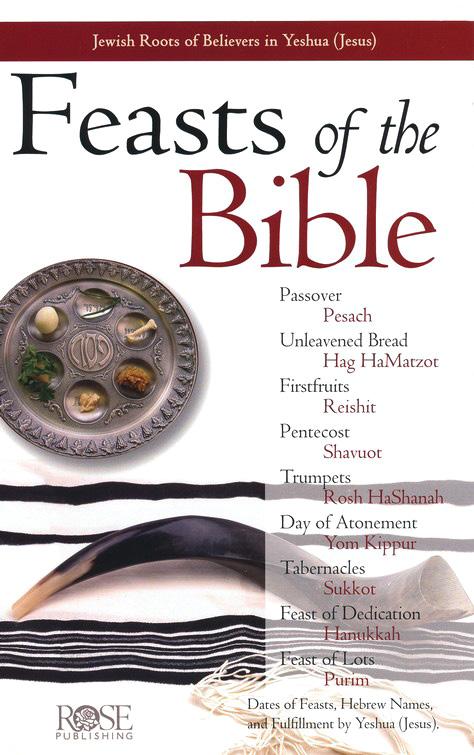

This revealing book will give you a fresh and in-depth understanding of the richness of Israel’s seven Godordained festivals! The feasts were a way of life for God’s Chosen People, the means by which they displayed and expressed their dependence on and gratitude toward Him. But did you know that all seven feasts hold vital prophetic significance?
Hardback Book – $19.95
ITEM CODE: BK1001


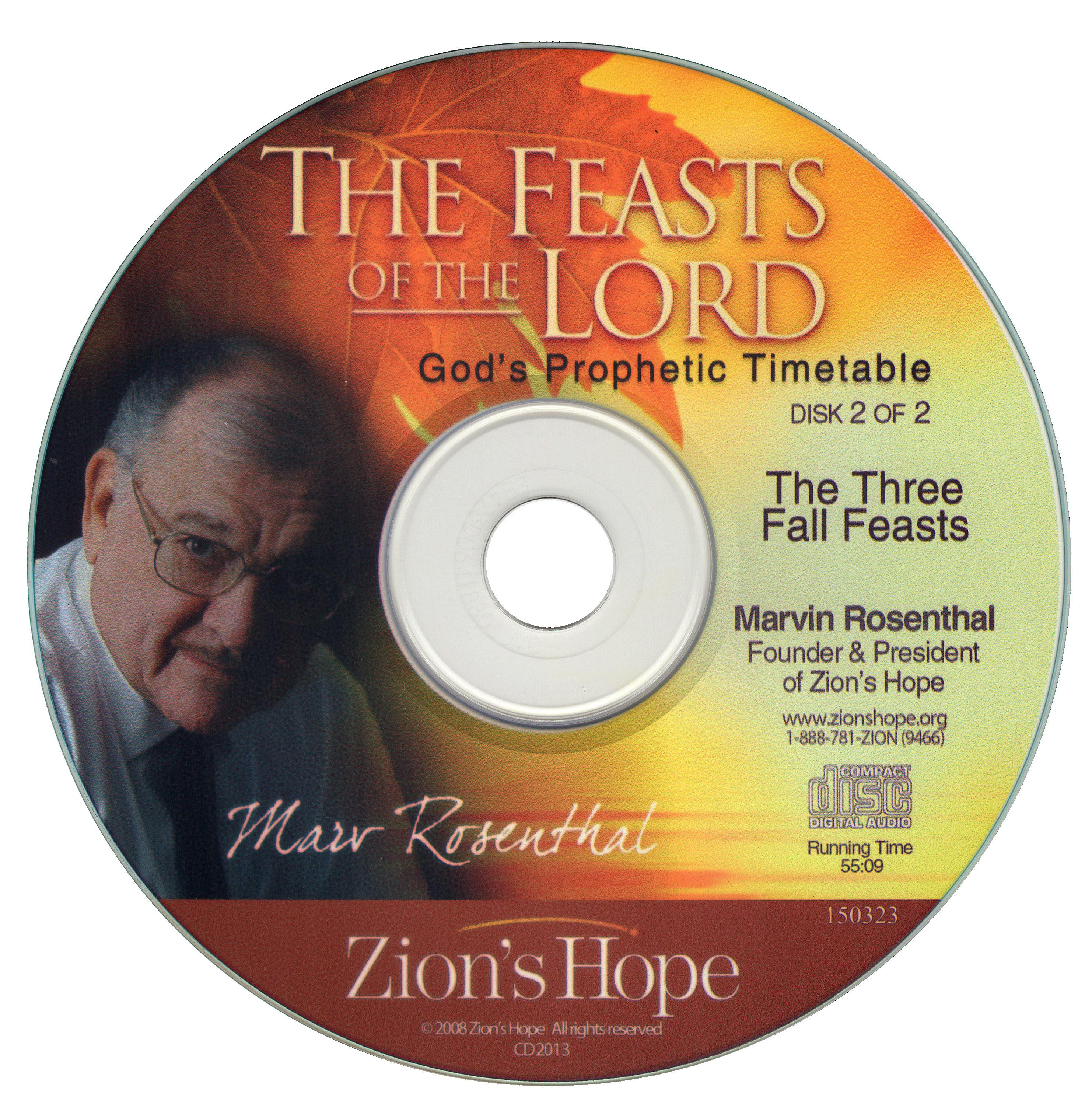

Throughout the Old Testament, God commanded the people of Israel to observe feasts and holy days (holidays) to remember the mighty things He had done in the lives of Israel’s ancestors. The Feasts of the Bible pamphlet is a full-color booklet that celebrates and explains the meaning behind the biblical feasts and why they are important today.
Pamphlet – $3.95
ITEM CODE: PM1014
The Feasts of the Lord: God’s Prophetic Timetable - 2 CDs
Learn how the seven feasts celebrated by ancient Israel have prophetic significance in the end-times scenario which will soon play out on planet Earth.
Audio CDs – $11.95
ITEM CODE: CD2013
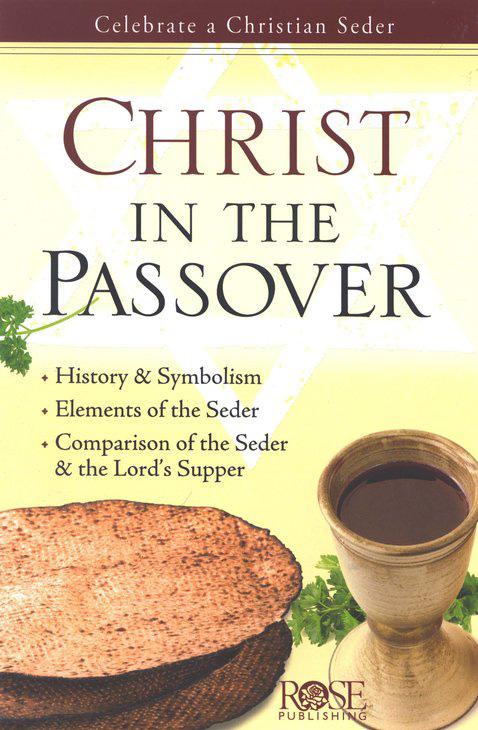
The Passover is the Old Testament feast that celebrates and remembers God’s liberation of Israel from Egypt. It also foreshadows Christ’s sacrifice on the cross. In just 14 pages, you will learn the history of this special day and the symbolism in the Passover that points to Jesus Christ. Christ in the Passover also includes a Christian Passover Seder script that can be used by Christians year round.
Pamphlet – $3.95
ITEM CODE: PM1024
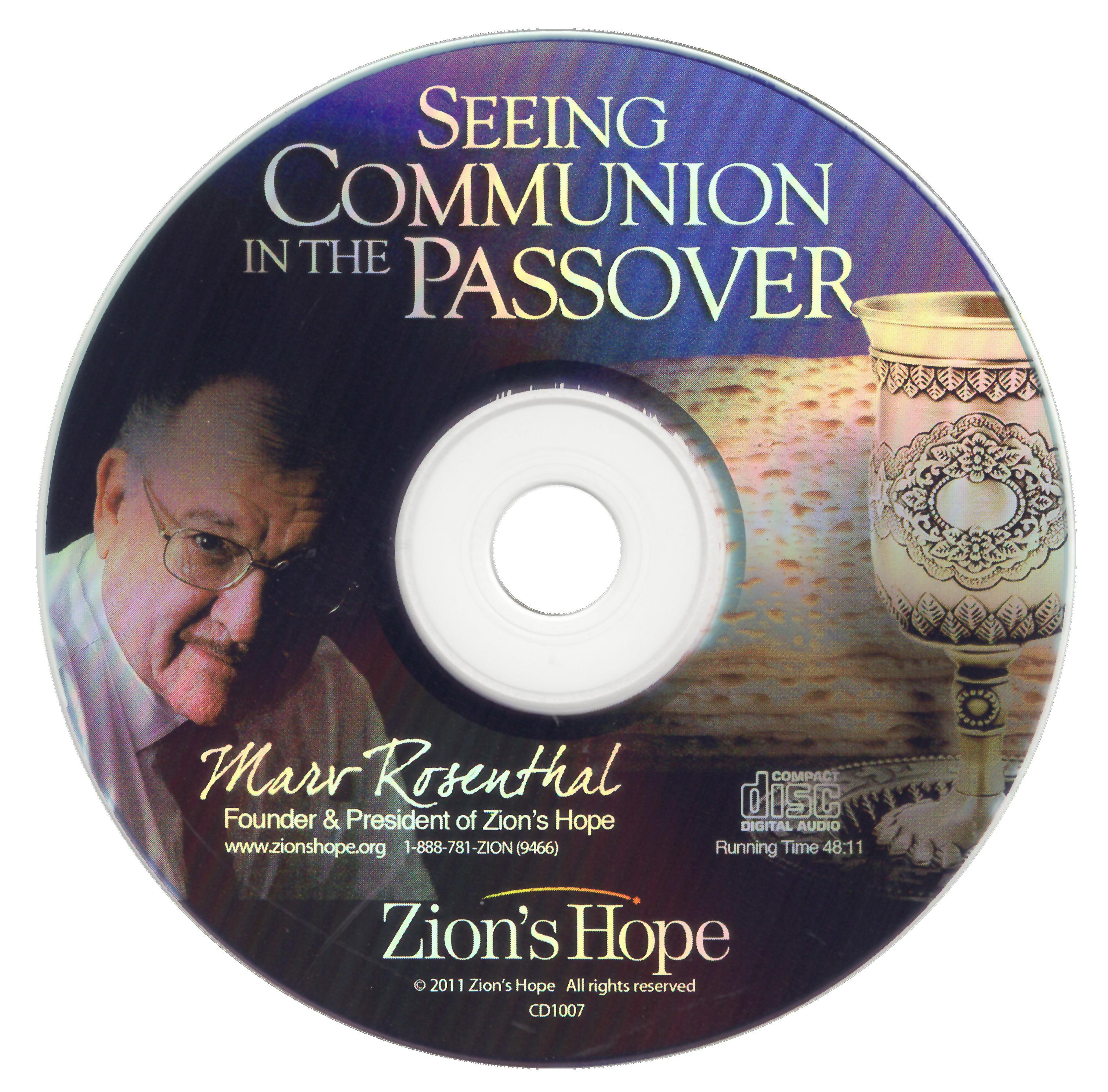
The Passover Seder celebrated by Jesus and His disciples held special meaning as our Lord instituted the New Covenant in His shed blood.
Audio CD – $7
ITEM CODE: CD1007
